Research Review 2022



As the world rebounds from a global pandemic and confronts profound social and environmental challenges, business schools across the globe are responding with a renewed sense of purpose and focus. The three elements of our mission— teaching, research, and impact—are vehicles for business schools to co-create solutions and innovations with industry, community, and government partners, and to inspire the next generation of leaders. Sprott School of Business is seizing the moment to make a difference.
Research at Sprott is integral to everything we do; much of the research includes an active engagement with local, national, and global partners to better understand problems and solutions in organizations and communities. Through these engagements and strategic partnerships, Sprott researchers create tangible impact and value. Equally, there is a conscious infusion of our innovative research into the pedagogy for our undergraduates, professional master’s students, and doctoral candidates alike, that fosters a synergistic approach to learning. Academics at Sprott embrace experiential learning methodologies that allow students to engage in the process of scoping and researching issues that are top of mind for our partners. In these ways, the three elements of our mission weave together with research at the core.
We are especially proud of the work that Sprott scholars are doing to foster equity and inclusion, to strengthen economic development in indigenous communities, to guide sustainable business practices, and to address mental health and wellbeing in the workplace. Sprott academics are also shaping global discussions about how we harness technologies, make financial decisions, and create environments for innovation and entrepreneurship.
Our business school, situated at the heart of a dynamic, global, G7 capital city, seizes all opportunities presented to forge meaningful partnerships and to engage in the issues of our time. As we continue to grow and attract new research talent, we continue to demonstrate the significant contributions of business to a better world.
Dana Brown Dean, Sprott School of Business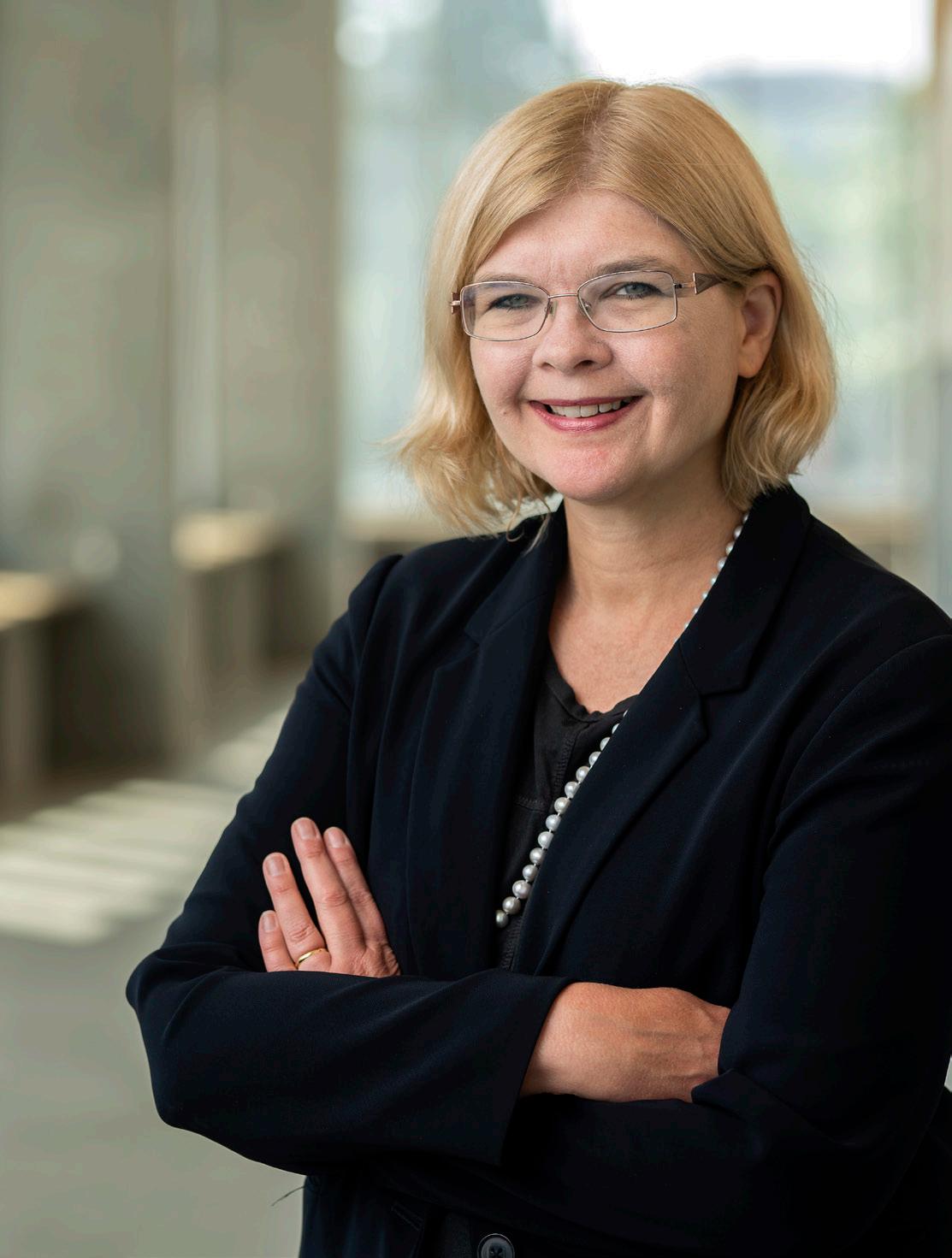
The 2022 Research Review, the fifth edition since its launch in 2018, highlights the major achievements in research by the Sprott School of Business—and its community partners in tri-agency, government, and industry funding—in knowledge creation, knowledge mobilization, and research capacity building. Due to the unique and unparalleled narratives that this publication regularly includes, business partners, Sprott management, and faculty alike affirm the Sprott Research Review as one of the most coveted publications produced.
In 2022, with thirteen SSHRC and twenty-five non-SSHRC new research grants—a total of more than $7.6 million collectively— Sprott researchers achieved incredible new milestones with record numbers of total grants submitted and dollars awarded by triagency, government, and non-government organizations. One of our major achievements is the creation of the Black Entrepreneurship Knowledge Hub (BEKH). In a highly competitive competition, and in partnership with the Dream Legacy Foundation, Sprott was the successful national candidate, winning the largest research grant ever awarded in Sprott’s history. The Knowledge Hub is the largest community-led and highly collaborative multidisciplinary endeavor, including over one-hundred business partnerships and thirteen universities across Canada. It is the first knowledge hub hosted by Sprott and a critical pillar in the Black Entrepreneurship Program (BEP) in Canada.
Ji, Associate Dean, Research and International
In addition to the significant growth in research funding and published scholarly works, Sprott is investing in the vital and valuable process of supporting and communicating about the research being conducted by both the faculty and graduate students. It is without question that one of the most valued members of our research team, Amanda Bradford-Janke, has led the charge in the arena of supporting and increasing our grant capacity and success beyond what Sprott has ever seen before. Last year, Amanda accepted the new role of Manager, Research Services and Initiatives, and has amassed a team— the Knowledge Mobilization and Research Support Officer and the Research Development Support Administrator— to support continued growth and dissemination of the exceptional and unique research that is happening at Sprott. It is the synergistic approach and collaborative environment among the Sprott faculty, staff, and students that fosters the incredible growth of our research.
I hope you enjoy the 2022 Research Review!
Shaobo Ji Associate Dean, Research and International
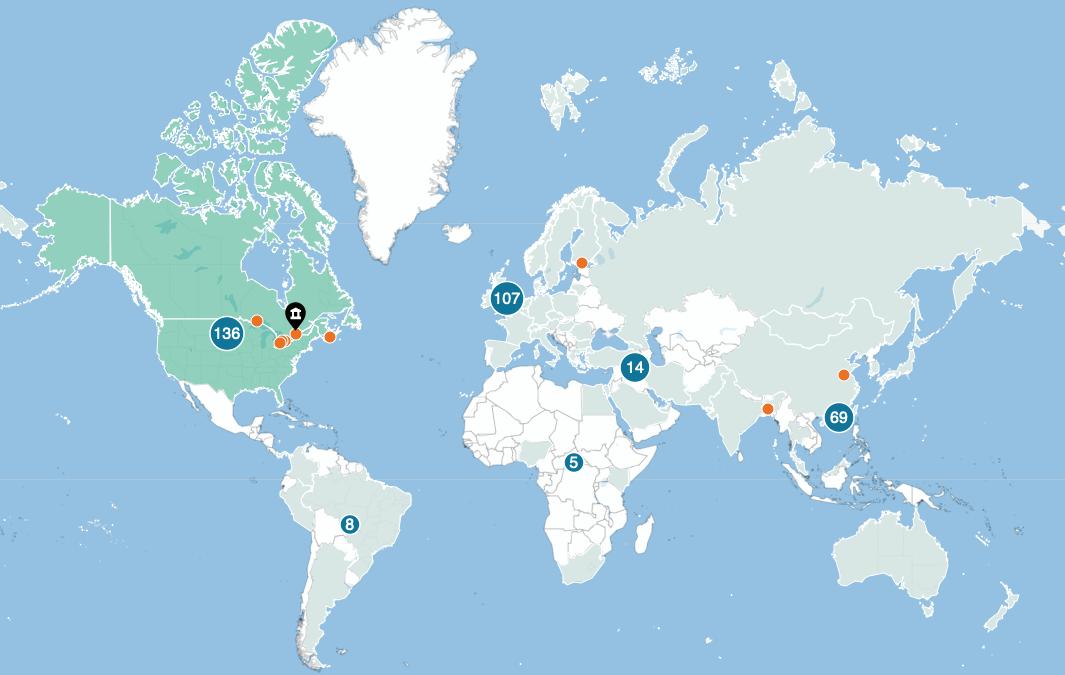
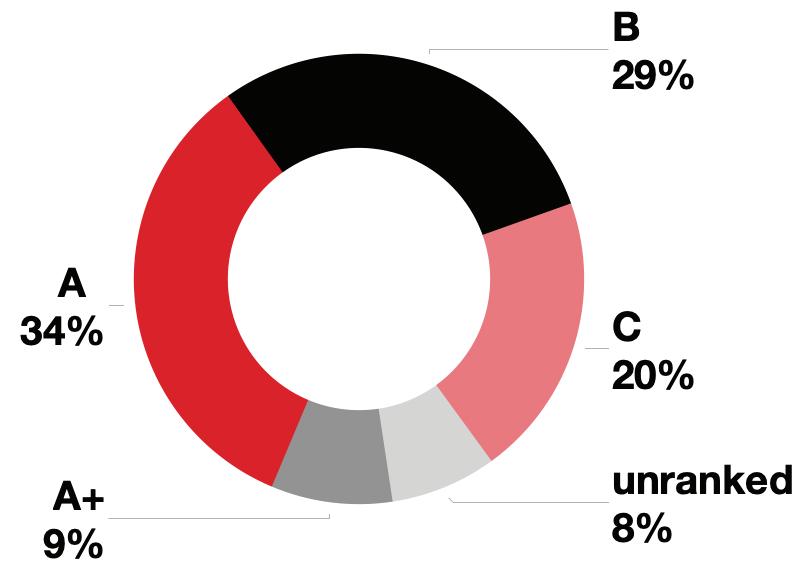
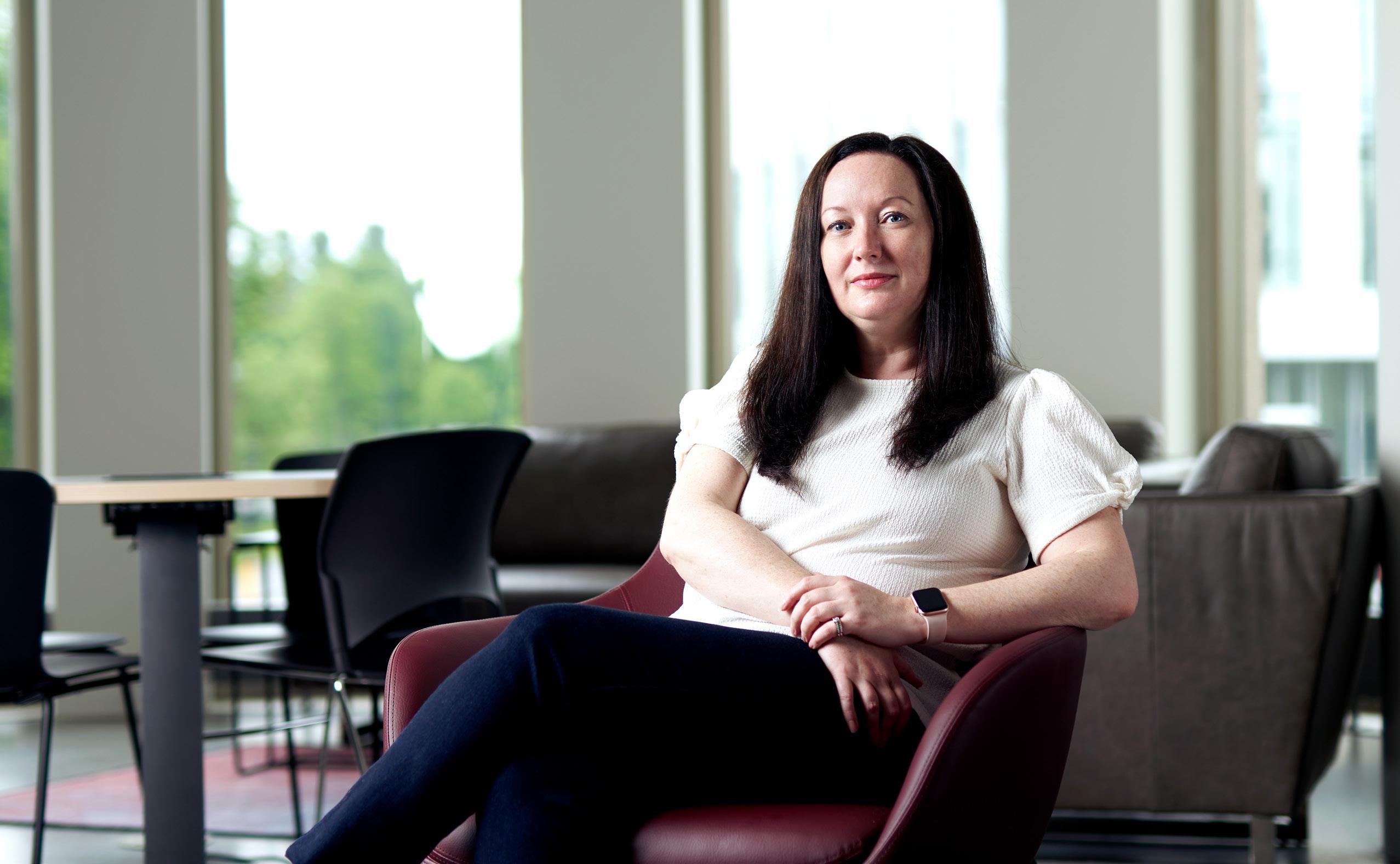
A vegetable sprouts from a seed in the ground. After it is consumed, its scraps can be composted and returned to the earth. This enriches the soil for the next crop and the cycle begins again. There is an inherent circularity to the food that we eat, but too often food waste interrupts it.
Each year, millions of tonnes of food are wasted in Canada—even as people go hungry. As individuals, nearly all of us contribute to this paradox. But individuals are not the only culprit. Food systems play a major role too.
“There has been a lot of work done on why individuals waste food, but it is also important to understand the role of grocery stores because you are subject to what they have to offer,” says Leanne Keddie, an Assistant Professor of Accounting at Carleton University’s Sprott School of Business.
Leanne studies sustainability accounting and is one of the principal investigators for “Waste? Know More! Igniting Behaviours for Circularity in the Food Supply Chain,” a study funded by the Social Sciences and
Humanities Research Council (SSHRC) that seeks to foster sustainable food systems by identifying ways that waste can be eliminated at every stage of production and consumption. This $234,000 grant is funded through the Imagining Canada’s Future Ideas program, and brings together researchers from Carleton University, Dalhousie University, Ontario College of Art and Design, University of British Columbia, University of Lethbridge, and University of Saskatchewan.
The first step to reducing food waste is understanding the factors that are contributing to it. Right now, there is not a clear picture of Canada’s food system. “There are really cool innovations happening, but they are only happening in pockets. We are asking why these innovations are not being scaled up,” says Leanne.
Leanne cites the Square Roots program in Halifax, Nova Scotia. Students at St. Mary’s University recognized that farmers were producing fruits and vegetables that grocery stores were not buying. At the same time, parts of Halifax were food deserts where people could not access fresh produce—typically lower socio-economic areas without a nearby grocery store. So, Square Roots partnered with farmers on a model that brings the extra vegetables to those communities and uses a “pay-whatyou-can” model.
“There were people who did not have access to high quality fruits and vegetables, and food that would otherwise have gone to waste. It is one small example of an innovation that is very localized. But there are other initiatives like it, and our question is what’s stopping these great ideas from scaling up? It could be policy, behaviour, or incentives. We want to identify what the barriers are.”
The case of Square Roots highlights a persistent problem in Canada’s food systems: Not enough food in some places and a lot of waste in others. And though we know that this disparity exists, it is not well quantified.

“Right now, some grocery chains do not even gather food waste data. Their systems are not built to handle it, so they do not have the underlying accounting data to even know the scale of this problem,” says Keddie.
“Food waste is just part of the way that grocery stores have always done things. But that is where
the accounting piece of this project comes in. There are ways to reverse engineer that knowledge with information in inventory management systems. If social and environmental data is not collected, then decisions will be purely financial. But as organizations broaden their view of what should inform decisions, having this information would change the way that decisions are made. Better data can help drive the transition to a circular economy.”
Better data would also help lower greenhouse gas emissions. Food waste is an outsized contributor to climate change. When organic matter decomposes in a landfill, it releases methane, a greenhouse gas that is even more potent than carbon dioxide. This only occurs when food decomposes without oxygen, so preventing food waste can make a significant contribution. And there are, well, some low-hanging fruit.
“Saving ugly fruits and vegetables by reprocessing them into quick pick-up meals reduces waste, while not offending current sensibilities about how food should look,” says Leanne.
“And there can be rules that prohibit giving away some fruits and vegetables or labelling requirements that result in imported foods being discarded because they do not meet Canadian requirements.”
There are many different factors that can contribute, and this initiative will conduct a broad assessment of what they are through a mapping exercise. “We are going to lay this all out—the innovations, the barriers, and the players. We want to get a snapshot of the food system as a whole,” says Leanne.
Leanne and her team will conduct interviews and surveys to gather insight on innovations and hold participatory design labs that bring people together to solve problems and co-create solutions.
“This will help identify pathways forward to help reduce the barriers and let innovations start scaling up. There are environmental, social, and business benefits to reducing food waste. It reduces greenhouse gas emissions and can increase access to high quality food. And from a business perspective, grocery stores have thin margins. Reducing waste helps those margins and that gives more money for other projects.”
Alan Cai is a data analyst—one who prefers to focus on the inner workings of a company rather than the customer-facing challenges of business (he started his career in marketing and quickly pivoted to organizational management for this reason), and yet Alan, Professor, Supply Chain Management, is an expert when it comes to relationship building. Even in the quiet of his office at Carleton University’s Sprott School of Business, Alan’s research focuses on relationships between business partners in the supply chain process and the social influences— such as community logic, social norms, and political ideologies—embedded into supply chain decisionmaking. Alan is excited that his research will contribute to a better understanding of how to develop, maintain, and grow supplier interactions.
When we think about supply chains, we tend to visualize businesses linked together end to end, where goods and services move from one end to the other. But in fact, they are more like a web of interconnected businesses that rely not just on a linear movement, but on the movement of goods and services from multiples sources. And so, relationship building within a supply chain requires that the focal company also consider and evaluate the potential relationship dynamics that exist with its other business associations. This is what excites Alan: “There’s a huge human nature component. Humans making decisions on how to interact with other people.”

He sees that supply chain relationships are complicated and that an organization must learn how to design operational procedures to meet numerous expectations. This not only includes the direct relationship with any one supplier, but also several external forces and pressures that influence decision-makers and their willingness to work within any set of expectations.
Alan is interested in how the distance between two companies’ social environments contributes to potential conflict and trust levels with a focus on understanding the relationships between decision-makers. This is critical research because suppliers, of course, are globally accessible. This means that goods and services often come from various countries—each operating under different institutional environments and social pressures. Alan is particularly interested in how carbon emission data play a role in influencing supplier relations. For example, if a company wants to establish a reputation by following a set of corporate and socially ethical practices—such as a reduction in carbon emissions—then it must consider all its operational practices, including which suppliers it should select. However, the social pressures in one country to adhere to global/local carbon emission limits may not be as strong as, for example, caring for their employees, people, and community. The goal then is to somehow honour each other’s missions and align in best business practices. Two companies that conduct business but under different social pressures need to build trust with each other.
Alan is interested in how the distance between two companies’ social environments contributes to potential conflict and trust levels with a focus on understanding the relationships between decision-makers.
“It becomes quite a difficult operations-management decision under different institutional pressures. How do businesses navigate the difference? Can you trust the supplier for what they say they did? How do you measure it? That’s the difficult part.”
For this, their research often relies on qualitative questionnaires measuring management judgment that include questions such as: “In your heart, do you trust your supplier?” And “What kinds of measures do you take to evaluate your supply chain managers?” They also rely on big data to study how firms from different countries navigate their relationships under disparate social and environmental practices.
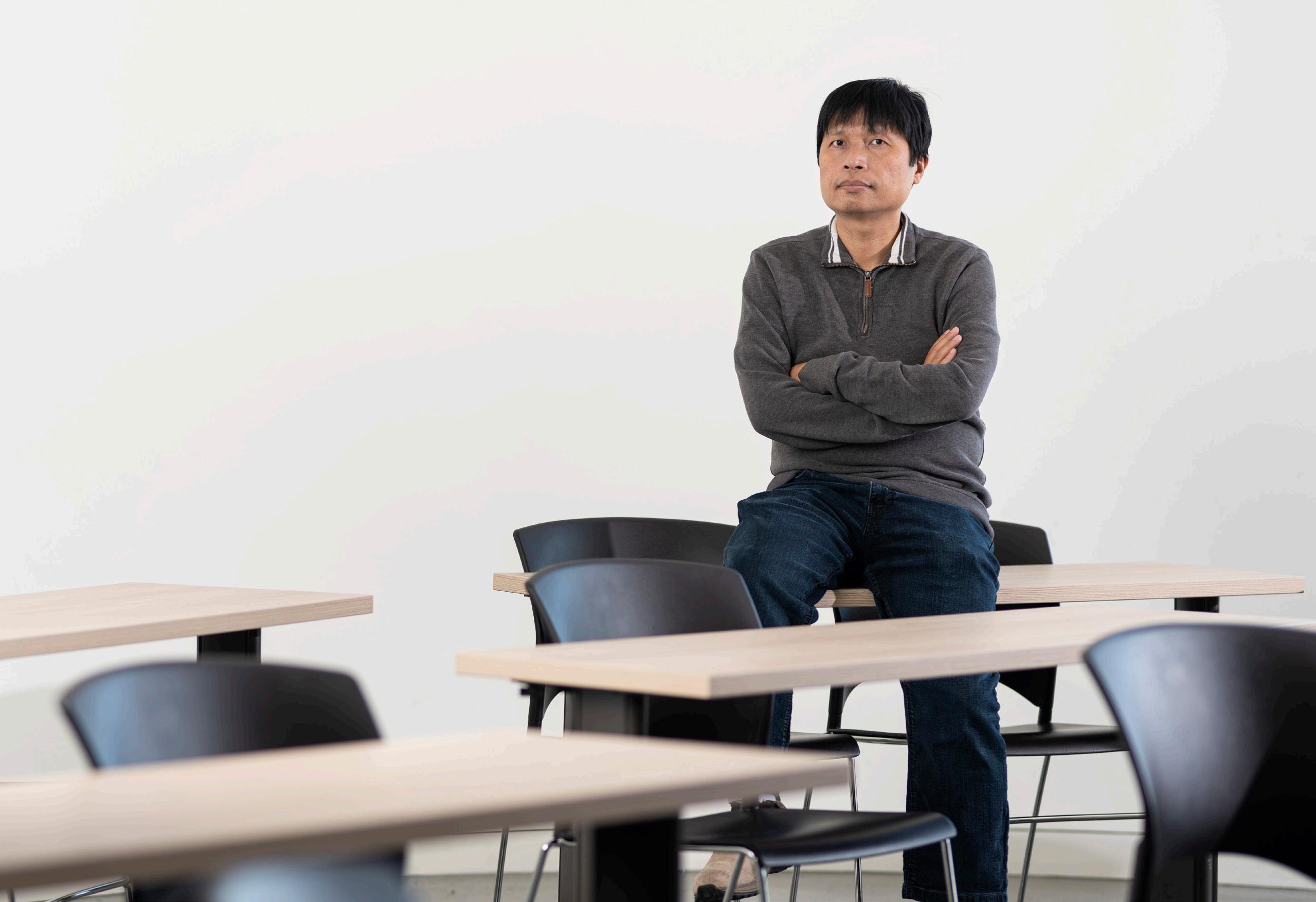
Alan and his colleagues will compare the data from companies that show high levels of trust to those that show low levels and determine variables that contribute to both successes and failures. Alan’s research goal is to bring awareness on how to improve the relationship between the supply chain members while concurrently allowing them to fit within the social constructs and pressures.
Alan’s research is extremely timely. “The pandemic has taught us that we need to be flexible. Companies may face future adversities, so those savvy companies will be prepared to shift and reorganize.” As such, Alan and his colleagues’ concurrent research includes applying sociology and economic theories to see how restauranteur decision-making was affected during the early stages of the Coronavirus pandemic. Restauranteurs had to decide between shutting down and laying off workers or staying open and keeping people employed, but risk spreading the disease.
“It’s a difficult trade-off because there are social pressures at play. Cultural tightness, for example— how strongly will society enforce the social norms— cannot be overlooked. The restauranteur is under pressure from not only societal and community expectations, but from government rules and regulations as well. It’s very interactive decisionmaking.”
Additionally, Alan’s most recent research project will reveal some interesting results about the effects of supply chain disruptions on geographic clusters of small businesses. It is under wraps for now, but Alan is extremely excited about the emerging concepts so far: “Results that will contribute greatly to our understanding of supply chain relations and ultimately create a globally resilient supply chain process.”

business experiences together and shown how they were all essentially cultural mediators—facilitating one’s ability to sell an idea. But she has also shown how valuable their contributions have been to understanding business and marketing theories today.
Leighann Neilson, Associate Professor, Marketing, is one of those people who draw you into their story about their life and academic journey—and hers is peppered with many unique and interesting experiences and serendipitous moments. It is a journey that defies the stereotypical trajectory one might take to get to professorship in business, but that is what makes Leighann’s knowledge and research program so robust and valuable.
Leighann will be the first to tell you that she loves academia, but in a think-outside-the-box kind of way, and her research interests certainly support this ideology. Leighann’s research program predominately focuses on the history of marketing, but she also explores other consumer-related themes from purist and theoretical perspectives and from one that allows for a multidisciplinary approach. Leighann describes her research as, “rooted in Canada, uncovering the history of feminism in business, and as storytelling that highlights historic figures in marketing and links them together.”
Leighann’s main research projects look at the historic dimensions of marketing through a multidisciplinary lens (sociology, art history, anthropology). She studies Canadians such as John Murray Gibbon, a publicity agent for CP Rail, Caroline Borden Hinman, an outback excursions entrepreneur, and Tom Thompson of the Group of Seven artists—all during the early 1900s. And, although they are all seemingly independent figures in history, Leighann has both successfully tied their
For example, John Gibbon authored a book called The Canadian Mosaic (1938) that offered up a unique and healthy perspective on the value of a culture comprised of people from different backgrounds and experiences. “It was a handbook for political marketing in Canada that resonates still today, so if someone like Gibbon can influence our immigration policy and our vision of what it means to be Canadian—the mosaic versus the melting pot—then it highlights the need to stay openminded, robust, and intensive with our research goals and vision.”
And, while researching Gibbon, she discovered Caroline Borden Hinman and fell in love with her story and life journey. Hinman ran an outback trekking excursion in the Rocky Mountains in the early 1900s for four decades—and was immensely successful at it. Being a strong feminist and advocate for highlighting women’s contribution in business (past and present), Leighann wanted to understand this woman who defied the odds of her time by not only being a woman entrepreneur, but by doing things women simply did not do (including wearing pants!). Hinman was a woman who broke stereotypes and expectations of women in business, and Leighann’s research aims at bringing such stories to the forefront of business knowledge because they contribute to our understanding of entrepreneurial strategies, and “there are very few accounts in the literature of female entrepreneurs who also contributed to social and economic development.”
Leighann sees the history of marketing as the key to unlocking our understanding of business because by understanding the past and those that contributed— both practically and theoretically—it offers up a much deeper perspective on how to evaluate our knowledge today. Leighann’s deep dive into understanding the genealogical aspects of marketing theorists propels her to encourage her graduate students to go as far back in history as necessary to truly understand:
“The past is where you learned the lesson. The present and future are where you apply the lesson.”
- Author unknown
“To pinpoint knowledge in a moment in time is shortsighted. There is always a before and an after. By exploring ideas, theories, and practices from the beginning, one can gain so much more out of what they’re studying. Multiple perspectives, a deep understanding of the discipline, and who contributed is so very valuable.”
Concurrently, Leighann is excited to embark on a freshly awarded Scholarship of Teaching and Learning (SoTL) Grant to support a cross-disciplinary project (sociology and anthropology) that will explore how students from equity deserving groups experience Carleton University’s research-based graduate programs. Leighann’s contribution to this study will focus on women and the intersection of gender with race.
“Through this research, we seek to investigate the dual experience of many graduate students as both learners and teachers within the context of ongoing racialized and gender-based disparity in Canadian universities.”
The research is extremely valuable as Canada continues to face ongoing systemic racism and inequitable issues pervasive within many Canadian settings.
Leighann is truly passionate about the genealogy of knowledge and our intellectual ancestors—the people who shaped marketing from the beginning. Plus, marketing history is where Leighann has found her fellowship—the people and academic space where she belongs. And she tells her students they should “respect who went before and appreciate their value. That is learning.”
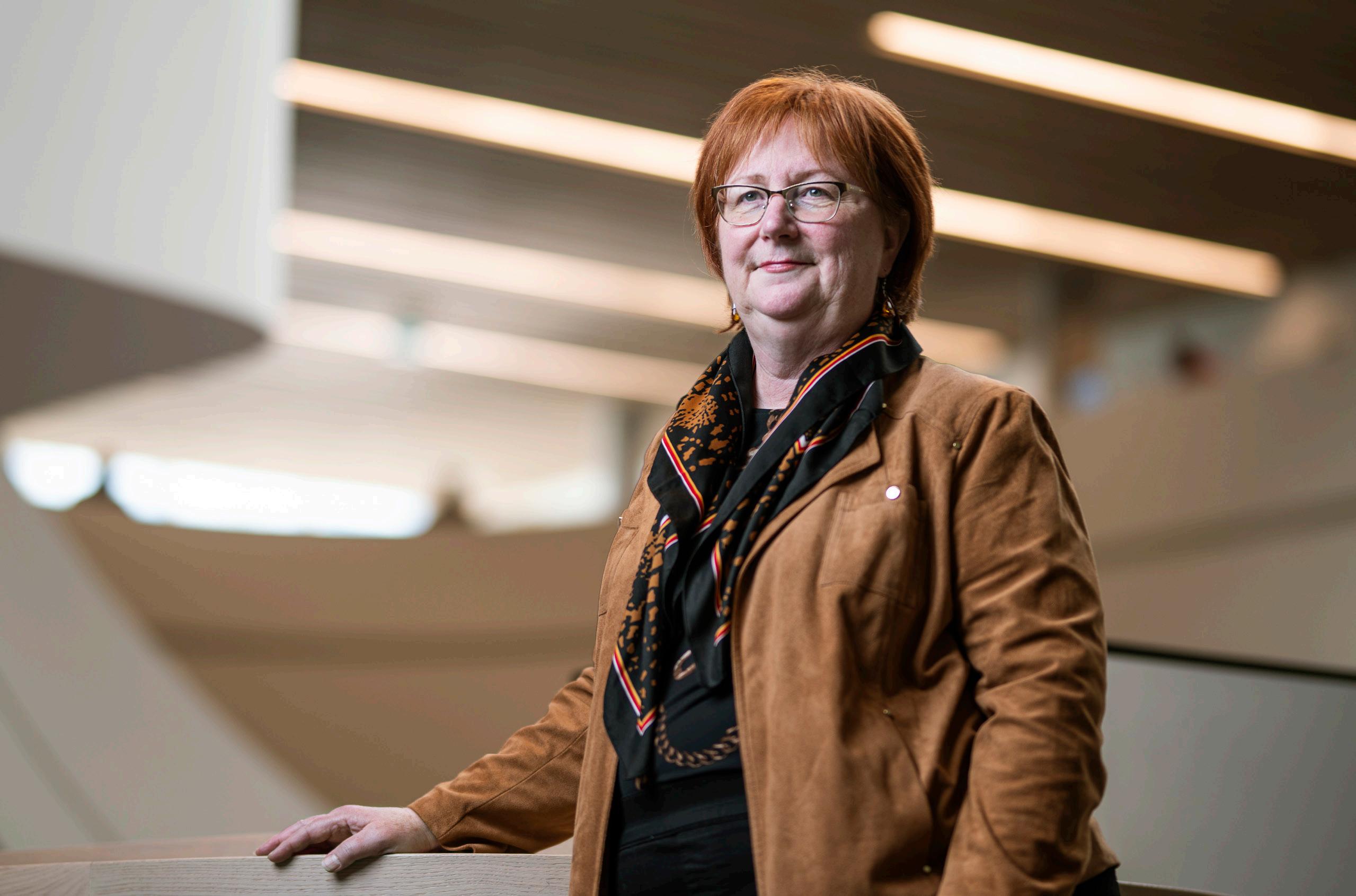 Leighann Neilson, Associate Professor, Marketing
Leighann Neilson, Associate Professor, Marketing
When we think about accounting, we often think of computing numbers and a high degree of adherence to rules and regulations—even seeing it as a purely objective profession. But Oriane Couchoux, Assistant Professor, Accounting, and a Chartered Professional Accountant (CPA), at the Sprott School of Business, knows that the profession is much more than that. In fact, there is a whole realm of complexities and nuances surrounding the practice because, simply put, accountants are human. An obvious statement perhaps, but research in accounting looks predominately at relationships between numbers rather than relationships between accountants and their business partners.

Oriane is extremely excited to begin her career at Sprott as she injects a valuable and understudied sociological lens on how accountants feel about their roles—their relationships, their challenges, and how they navigate through the complexities and different pressures in the accounting world. Oriane’s goal is to highlight CPAs’ unique experiences and perspectives—to give them a voice—ultimately to provide tools for the profession to build better financial reporting processes and ensure the profession fulfills its commitment to the public.
Financial reporting and auditing processes are essential for investor decision-making, and as such, must prove highly valuable and instill a high degree of trust and confidence. However, due to recurring corporate scandals involving accountants and auditors, many countries have established independent regulatory organizations as proverbial “watch dogs” to reassure the public and bolster investor confidence and protection. Since then, “there have been many rules implemented
to improve the quality of the work performed by accountants and auditors, but there are complexities depending on cultural aspects and socio-political environments, and as such, there’s considerable room for interpretation by auditors and their regulators— they’re human, so of course each person will interpret and enact these rules differently—sometimes it creates good outcomes, but other times issues.”
This is where Oriane is particularly motivated with her research. Having worked as a CPA—both as an auditor and as an accountant responsible for preparing financial statements—Oriane understands the confounding effects of maintaining the best interests of the client and the public, keeping employer costs in check, and more recently, satisfying the external regulatory inspector’s ideal around best practices. Oriane recognizes this complexity is all about relationship management. It is a tug-of-war of different competing logics.
“There is the professional expectation to uphold public service, but also manage the relationships within the firm and with their up-front clients—and now their regulators.”
Oriane’s research explores these pressures through qualitative interviews to understand how auditors feel about these pressures, how they do their job, and how it impacts the quality of their work. Oriane recognizes the value of approaching the research with a social constructive lens because it brings so many of the unseen issues around financial reporting to the surface. And by better understanding the relationship dynamics between CPAs and their major constituents—and by revealing the prevailing issues—Oriane believes her findings will contribute to developing initiatives that help CPAs and regulators navigate the multidimensionality of their roles more successfully.
Moreover, Oriane’s most recent research offers important new insights into governance processes and the crucial role corporate directors play in the ultimate success of financial reporting processes. Specifically, Oriane’s research teases out important self-reflective
elements on audit-committee members’ perception of their financial literacy and ways this influences how they approach their oversight mission.
“The risk is creating audit committees comprised, on paper, of an eclectic pool of knowledge, and then having some of these audit-committee members underperforming in practice because they don’t believe they possess the necessary expertise to fully understand and oversee auditing and financial reporting processes.”
Oriane’s findings bring a novel sociological perspective to the implications of regulatory initiatives that focus on corporate directors’ resumes, titles, and designations, rather than on the skillsets directors in fact use and their willingness to engage.
For Oriane, one of the most alluring aspects of joining Sprott is being able to connect and collaborate with other academics who foster unique and novel approaches to research.
“I love the flexibility to take my research in the directions that I feel most enthusiastic about.”

On point, Oriane looks forward to future research projects that will continue to investigate the changes happening in the accounting profession and to explore the financialization and performance pressure associated with parenthood.
As an enthusiastic advocate, Oriane is still very much involved with CPA Canada and is actively involved in non-profit organizations in Quebec that aim to find solutions to the “unprecedented daycare space shortage” and help women better manage career and family obligations.
Joining Sprott allows Oriane to combine her love of accounting research and its mission to public service, with her love of teaching and sharing knowledge—all while beautifully weaving her growing family. She is one amazing human behind the accountant.
In only four years with the Sprott School of Business, Samira Farivar, Assistant Professor, Information Systems, is producing tremendous and breakthrough research in the social media and information systems arena. Working under a SSHRC Insight Development grant, Samira and colleagues have made rapid strides with their research, having published four journal papers with a fifth in the works. Their research provides highly valuable and unique insights on many untapped perspectives about social media influencer-follower relationships and the persuasive power of influencers over followers’ purchase intentions in a world that is quickly emerging as a very lucrative business platform.
The research findings reveal ways for influencers, business collaborators, and followers to maximize constructive engagement and foster healthy relationships—ultimately to help create successful business strategies and outcomes. Moreover, Samira’s research injects a novel sociopsychology lens that taps into the precarity of relationship management among and between followers, influencers, and the branding collaborators.

The social media world as a business platform is both in its infancy and becoming a key player as a marketing tool—and is a market that is currently worth over 40 billion dollars US—yet the emerging benefits and risks are still largely unknown. Samira’s research provides a three-pronged approach to unveil the perspectives and factors that form and shape influencer-follower relationships (with a concentration on those influencers that market fashion brands and services on Instagram). Analyzing survey and social media data, their findings provide a wealth of knowledge into the importance of follower social identity with influencers and how it impacts follower purchasing decisions. Being the first
researcher to introduce the social identity construct to the influencer-marketing literature, Samira shows that having a sense of community—or belonging to a microculture—is a key variable that fosters a cohesiveness between follower and influencer.
“It’s about quality over quantity, so when influencers concurrently take care to be responsive, encourage peer interactions, engage in live stream sessions, and share more with their followers, they create a value in their relationships that builds the sense of community and ultimately greater “influence” over their followers’ purchase propensities and behaviours.”
What’s more, Samira’s research reveals a novel key influential variable: Storytelling. They show that storytelling—as an approach to showcase a product or service—adds significant persuasive purchasing power by leveraging the positive effects of society identity. “Storytelling is so influential because it goes back to why people follow influencers—they find their lives interesting and want to know more. Personal connection is very important.”
Further to this work, Samira and colleagues are the first to integrate and compare the effects of opinion leadership (which plays a pivotal role in marketing communication as expert influencers in their field), and parasocial relationships (which exist when influencers have a one-directional relationship with their followers, such as celebrities with their fans) on influencer marketing outcomes. By exploring the relationships in combination, Samira and her team can identify the more salient value of parasocial relationships of influencers and their followers because it fosters a more personal relationship that ultimately positively influences their followers’ purchase intentions. This is key for both business collaborators to identify suitable influencers for branding and marketing and to help influencers recognize and utilize effective relationship-building strategies.
Samira’s research adds a third prong to the literature and first in the field to contribute to and further amplify the impact of the “dark side” of social media influencers. Currently little is known about followers’ addictive and problematic engagement with social
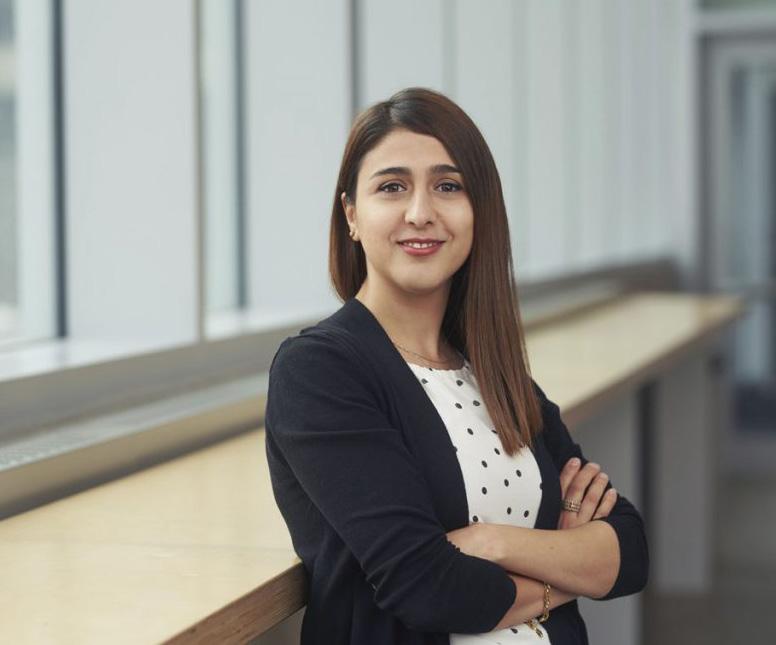
media influencers. Samira’s research evaluates the engagement imbalance and emotional impact that can ensue when followers establish an unhealthy relationship with their influencers. It is a conscious responsibility of the follower to become aware of their social media habits and their potential effects on their wellbeing, but as well, influencers can mitigate the potential of problematic engagement by first understanding the factors surrounding social identity, and then utilizing the strategies to create and foster healthy user habits and community relationships.
Samira’s robust and ground-breaking exploration of the social media engagement context injects a highly valuable sociopsychological lens to help develop strategies that foster a knowledge-based and healthy relationship dynamic among social media users and their online community, influencers, as well as business collaborators alike.
The Centre for Research on Inclusion at Work (CRIW) is announcing the departure of inclusion champion, Merridee Bujaki, who is stepping down after serving in CRIW’s leadership for over ten years. She brought to the Centre her established expertise in gender issues in management and women in the accounting profession. CRIW is grateful for Merridee’s dedication and years of service. Merridee shared her views on her years at CRIW and what workplace inclusion means to her.
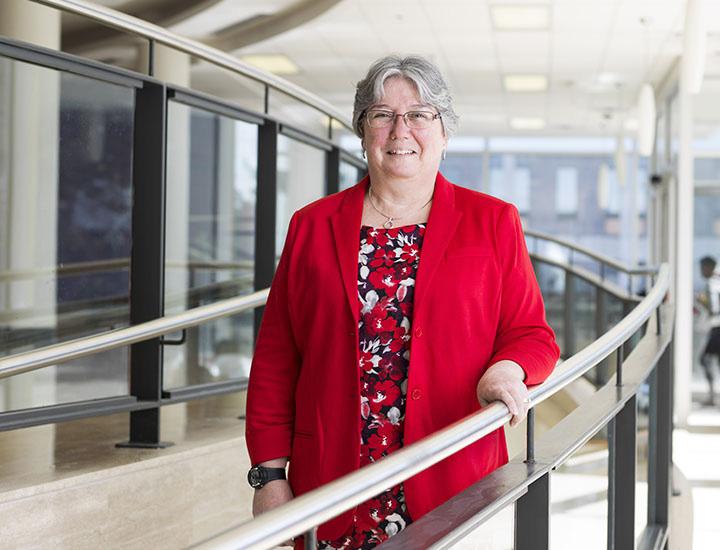
Early in her career, as a professional accountant, Merridee experienced how inequity creates substantial challenges for women in many professions. Her experiences with inequity, along with her undergraduate degree in Cross Cultural Psychology, are some of the influences that inspired Merridee’s interest in inclusion.
Reasons for getting involved with CRIW: My interest in women drove my interest in CRIW. I first got involved with the Centre teaching in the Management Development Program for Women. For about ten years before even joining Carleton, I taught accounting to a diverse group of women in the program and really enjoyed it. Shortly after I joined Carleton I was asked to take over as director of the Centre. I saw this an opportunity to give back to other women. I took the leadership position to help women develop the skills that they needed to be able to compete in a world which I knew from my own experiences was not always welcoming.
Views on inclusion : For me, inclusion starts from who I am in my own personal identity as a woman and what my own experiences or observations about exclusion have been. Inclusion tends to be more challenging for people who are diverse in multiple ways. As I get older and through my involvement with CRIW, I see that more of what we experience in life is not under our direct control. We are influenced and constrained, or in some cases given opportunities or privileges, by circumstances that we have no real ability to influence. And so, I see inclusion as trying to make the world a better place, a more welcoming place for all kinds of people where we can all benefit and flourish. This realization has influenced how I prioritize my projects. As CRIW broadened its focus to inclusion, I made a deliberate choice to expand my research to look at some of those broader inclusion areas, including mental health and Indigenous peoples in accounting.
Most significant support from CRIW: CRIW’s Writing Retreats have been highly valuable. These retreats (sadly halted during the pandemic) created opportunities for women to single-mindedly focus on their writing, but more than that, the retreats were also instrumental in developing a sense of community

among faculty members. The connections I made at the writing retreats changed the way I work. I am much more collaborative, much more appreciative of the other people, also much more aware of some of the inequities that exist within academia.
CRIW’s impact on research: I have also benefited from research funding programs available through CRIW. You would be surprised what a $5,000 grant can do. CRIW funded the “Healthy Academic Women and Work” project that was the impetus for a larger grant application. CRIW’s research funding was the seed that led to a $150,000 Partnership Development Grant, which in turn lead to a $1.425 million SSHRC-CIHR grant involving roughly twenty-five individual academics from about seventeen different universities from across the country.
As I get older and through my involvement with CRIW, I see that more of what we experience in life is not under our direct control. We are influenced and constrained, or in some cases given opportunities or privileges, by circumstances that we have no real ability to influence.
The Black Entrepreneurship Knowledge Hub (BEKH) was officially announced in late 2021 by the Honourable Mary Ng, Minister of International Trade, Export Promotion, Small Business and Economic Development. Minister Ng made the announcement in Sprott’s new Nicol building and was joined by the Honourable Greg Fergus, Parliamentary Secretary to the Prime Minister and to the President of the Treasury Board and Chair of the Parliamentary Black Caucus, as well as Yasir Naqvi, Member of Parliament for Ottawa Centre.
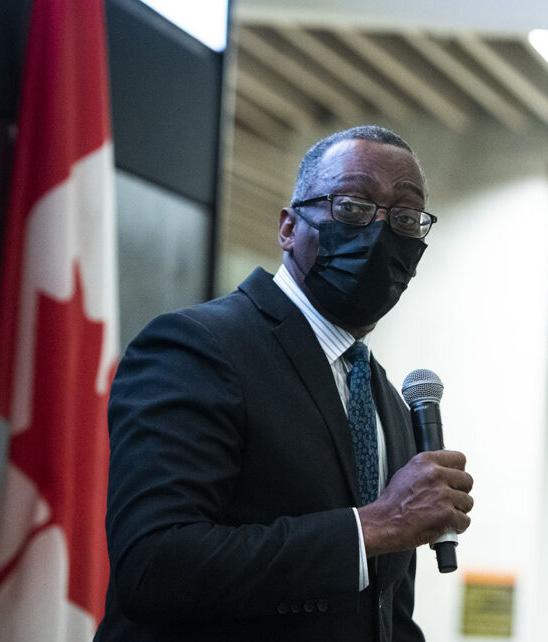

“Black Canadian business owners and entrepreneurs make significant contributions to the Canadian economy and to the communities around them, but they continue to face systemic barriers, many of which have been amplified by the pandemic. Our government’s investment to establish the Black Entrepreneurship Knowledge Hub will lead to a better understanding of the barriers Black entrepreneurs face and help identify opportunities for growth. This is another crucial step toward a more inclusive, more just, and more prosperous Canada now and for future generations.” The Honourable Mary Ng, Minister of International Trade, Export Promotion, Small Business and Economic Development
Funded by the Government of Canada, BEKH will be a collaborative, co-generated, and high-quality knowledge and data platform that reflects the state of Black Entrepreneurship in Canada. It is the third pillar in the Government of Canada’s Black Entrepreneurship Program—created through a $5 million investment from the government. BEKH’s principal partner, Dream Legacy Foundation, is a Black-led non-profit philanthropic organization based in Toronto that focuses on diversity and inclusion with an emphasis on the Black community and other under-represented groups.

BEKH
and
Carleton University; Honourable Mary Ng, Minister of International Trade, Export Promotion, Small Business and Economic Development; unknown; Honourable Greg Fergus, Parliamentary Secretary to the Prime Minister and to the President of the Treasury Board; Rick Colbourne, Associate Dean, Equity and Inclusive Communities, Sprott School of Business; Pako Tshiamala, Humanitarian Grand Challenge; Rafik Goubran, Vice-President (Research and International), Carleton University; Dana Brown, Dean, Sprott School of Business
“Carleton University is pleased to partner with Dream Legacy Foundation in engaging and mobilizing an extensive network of Black entrepreneurs, non-profits, community organizations, and academic institutions in the co-generation of culturally relevant research and in capacity building that will contribute to the socioeconomic health and well-being of all Canadians. This exciting initiative aligns closely with Carleton’s values of inclusion, collaboration, community, and purpose. Our sincere thanks to Minister Ng and to Innovation, Science, and Economic Development Canada for your partnership and your commitment to breaking down the barriers to inclusion for Black entrepreneurs across Canada.”
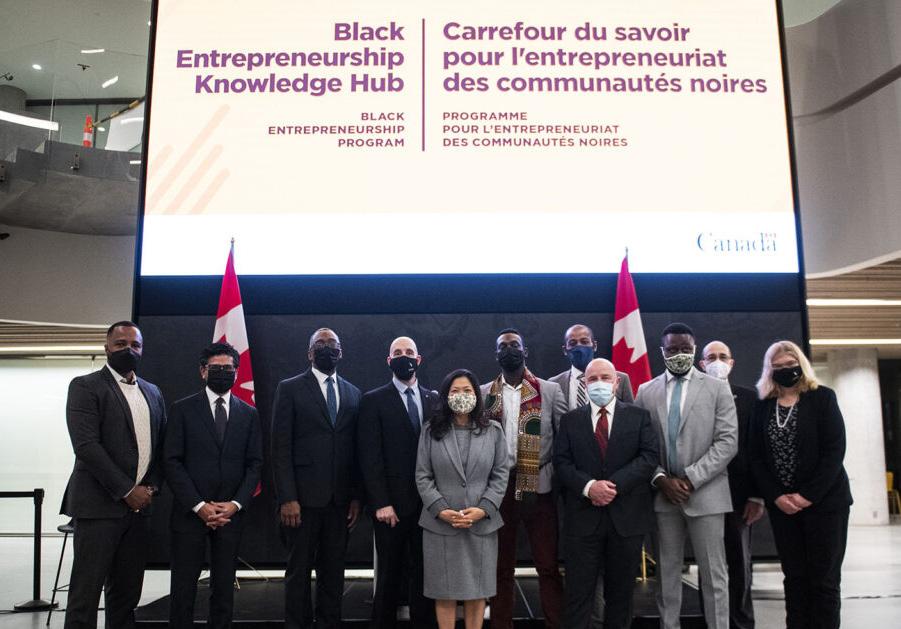 Benoit-Antoine Bacon, President and Vice-Chancellor, Carleton University
Benoit-Antoine Bacon, President and Vice-Chancellor, Carleton University
Gerald Grant, BEKH co-lead and Sprott Professor, Information Systems, has been building the infrastructure and hiring staff throughout 2022. Housed at the Innovation Hub within the Nicol Building, BEKH hosted an open house in late September to welcome members of the community including researchers, entrepreneurs, faculty, and students. Gerald and BEKH’s Executive Director, Andrea Pierce, presented on the work the hub will be undertaking and how the community can get involved. BEKH’s mandate of “Research with and for Community” and collaboration with stakeholders was at the heart of the event. BEKH is committed to ensuring that the voices and participation of scholars, students, community researchers, communities, and entrepreneurs are centered in their work.
Shi Li is an Assistant Professor of Finance who joined the Sprott School of Business in 2019 after completing his PhD in Finance from the University of Manitoba. Not long after joining Sprott, the pandemic shut down the world and created new ways of interacting and doing business. During this time, the meme stock craze took the financial world by storm and has given opportunities for new research ventures. We recently chatted with Shi to learn more about his time at Sprott and this unique pandemic-born phenomenon.
What attracted you to a career in higher education?

From an early age, I liked connecting two different things and exploring the relation between them. Later, I would make a prediction based on such relations and see whether I was right. I would be extremely excited when my predictions were right, although I was not right all the time. Those situations pushed me to do further investigation. The entire process of overcoming intellectual challenges was difficult, but it was also attractive.
Being a university professor is the ideal job for people like me. Everyday is enjoyable because you can work on your area of interest and be surprised by new insights about the financial markets. My dream is to advance academic knowledge, share my findings, and resolve doubts. Being a professor provides many opportunities to share what I have found and learned with my students.
What current research are you working on?
My current research project revolves around retail investors and meme stocks. Retail investors are nonprofessional investors who invest their own money for their own benefit. A meme stock is a stock that gains popularity among retail investors and where prices are strongly influenced through social media. As such, meme stock prices often soar dramatically within a brief time, driven by their high popularity on social media. Examples that people may be familiar with are GameStop and AMC entertainment.
The recent performance of meme stocks during the pandemic has really motivated my research direction. Most people first heard of meme stocks when retail investors began using Reddit—a discussion website—to spread the word and help boost the stock price of the video game retailer, GameStop. These investors can put their small trades together and make a significant impact on the market.
Despite their eye-catching performance and popularity in the financial press, little research is available on the evolution of meme stocks. My goal is to examine how these stocks progress and their implications for the market and policymakers.
Why do you think meme stocks have grown in popularity?
Currently, there are numerous online brokerages, such as Wealthsimple, that make it easy for a retail investor to do as many trades as they like without incurring any fees. Compare that to when I was a student and I had to spend ten dollars to make one trade at TD Bank! Due to this, the power of retail investors is growing. Moreover, the impact of social media has been profound—it can be a way for companies to distribute information, and as well, for retail investors to come together and make a significant impact on the market. In the future, I believe retail investors will become increasingly more important to the market thanks to the rapid growth of innovative technology, social media, and financial literacy.
More specifically, I want to know why retail investors pick these meme stocks and why the meme stock
phenomenon only started to happen during the pandemic. My research will examine whether meme stocks belong to the category of lottery-like stocks because their stock prices are quite low. Lottery-like stocks are those with a price lower than five dollars. The key feature is that they behave like a lottery—you have the potential to earn a lot of money, but ninety-nine per cent of the time you lose your money. I want to know what additional characteristics, if any, make the meme stocks different from traditional lottery-like stocks.
What impact are you hoping your research will have in this area?
Meme stocks are mainly held by retail investors, but these investors have much less knowledge about these investments. I want the findings from my research to be used to show less experienced investors the differences of investing in meme stocks and lottery-like stocks so that they may have a better sense of the risk.
It is easy to be misled by fake news and social media so my hope is to help inexperienced investors make better decisions and invest wisely. Also, while it may be beneficial to participate in no-fee online trading, the risks associated with loss increase—the more you trade, the more possibility there are for mistakes and losses. In the future, I hope that the investigation of the evolution of the meme stock phenomenon will help regulators initiate policies to protect investors and markets from significant movements.
What have been your favourite courses to teach so far?
Currently I’m teaching Business Finance I (BUSI
2504) and Business Finance II (BUSI 2505). I enjoy teaching Business Finance as it is a core course for undergraduate students at Sprott, so I can teach students from concentrations other than Finance. The students in my classes are very engaging and I was touched by their eagerness to learn more even though for some of the students, their main interest is not Finance. I am happy to share my passion for Finance as it may help to inspire some students to also pursue academic research in the future.

What is your favourite part about being a professor?
I enjoy the variety in my job. I am able to experience new and different things everyday. This profession allows me the freedom to work on my own and build my own schedule. I get to conduct research on the areas of Finance that I find the most interesting. Everyday I face different challenges and I feel a profound sense of achievement when I overcome those challenges. As well as research, I also enjoy teaching and being able to discuss the latest financial news with students in the classroom. I like to engage with my students and hear their opinions on current issues which is always quite interesting.
Jogging is a wonderful way for me to relax and take care of my health, both physically and mentally. It is a good stress reliever and helps me forget about the day and unwind. I also really enjoy watching movies. It is a fun way to escape into a different life for a few hours!
Mohamed Al Guindy, Assistant Professor, Finance, is an expert on how social media plays a role in financial markets. Mohamed was awarded an Insight Development Grant (IDG) from the Social Sciences and Humanities Research Council (SSHRC). His new grant, “Exploring Robonews in Financial Markets: An A.I. Approach,” was ranked second overall by the business and management committee at SSHRC! We chatted with Mohamed to learn more about this exciting area and what is on the horizon for his emerging research.
Congratulations on your IDG grant! Can you tell us more about this new phenomenon: Robo-news?
Historically, journalists have been the ones writing news and generating content. We are now seeing a shift where a lot of the news is written by robots instead of humans. This can be seen in all forms of media: articles, press releases, and social media. Trusted news sources, such as the Associated Press and The Washington Post, use robots to generate some of their content as well. And it is not always easy to determine if the information is from a human or a robot. Accountability is therefore a big problem, especially when we think about other forms of media, such as Twitter. With the use of robotgenerated news, the onus is now on the consumer to verify the reliability of the source of information; it is an added responsibility for the public. This is relevant right now with Elon Musk going back and forth about acquiring Twitter before he eventually took the helm. One of his main criticisms is that there is a significant amount of robot-generated content on Twitter. Elon Musk views this as a negative—and that may certainly be the case—but we do not know until we research and find out.
My focus is on the impact of robot-generated news on financial markets. For example, in finance, when there is news about companies or the economy, there is typically a market response. We are interested in how the market may differ in its response to robo-news compared to news written by a human and which method of communication has a greater impact and drives financial markets more. That is one of the most important research questions we are asking.
The initial study will explore the impacts via the social media platform Twitter. We will analyze over 350-million financial tweets written about thousands of North American firms. Our goal is to be able to identify robotgenerated content and quantify the impact on financial markets. Then compare this to human-generated content to assess and determine parameters for gauging relative impacts. Robo-news may come out better at certain times and worse at others, such as during times of recession or when the economy is moving downwards, for example.
How do you identify robot-generated news?
In this case, we are using artificial intelligence (A.I.) algorithms—specifically unsupervised learning—to identify robot-generated content. We will use patterns and habits to differentiate robot- versus humangenerated news. For example, if a Twitter account generates about five hundred tweets a day, it is unlikely to be a human. As well, if a Twitter account follows over a million people, but does not have any followers, this account likely contains content generated by a robot.
Once we are able to distinguish robot-generated from human-generated tweets, we can create an index that details the metrics for each, such as number of posts. As well, we will examine the sentiment of the post—is it positive, negative, or neutral in nature with relation to financial information? With all of this data, we can then deduce how each type of tweet correlates with financial markets. For example, if human-generated tweets are optimistic in nature and robot-generated tweets are pessimistic in nature, and we see that markets are in a downturn, this may suggest that robot-

generated feeds are better predictors of, or in sync with, market movements. Or, of course, vice versa. We are very interested in learning which type of news and communication feeds are better predictors and therefore more impactful—humans or robots.
How will the research be conducted and who are your collaborators?
We will be utilizing Sprott’s Social Media and Finance Lab. I recently received funding through the Canadian Foundation for Innovation (CFI) to strengthen and expand the capacity of the lab. We need a tremendous amount of computing power for this project given our large dataset. The funding from CFI really makes this work possible and will make this lab the first of its kind in Canada. With the help of one of the world’s most advanced A.I. supercomputers, this research will become possible.
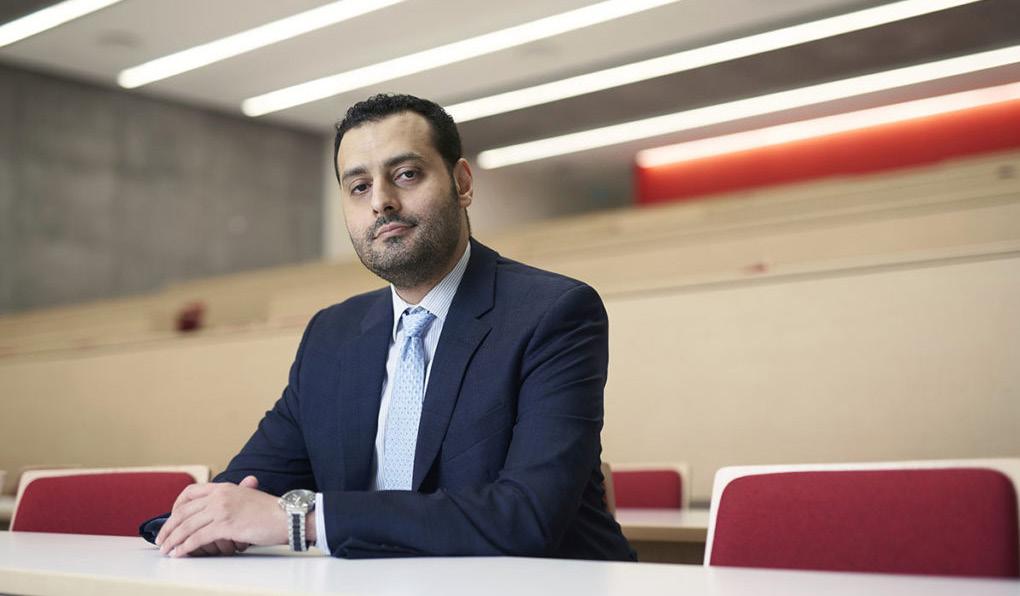
I will be working with two collaborators from Carleton University—Olga Baysal, Associate Professor, Computer Science and Sandra Robinson, Assistant Professor, Journalism and Communication. Since this project deals with A.I. and social media, it was important to
have research collaborators who are specialists in these fields. The work will benefit incredibly from Olga’s computing expertise and from Sandra’s knowledge of journalism and the media profession.
What do you predict for the future of robo-news?
Primarily, there will be an impact on the journalism profession. Can people in that profession still survive in this career? Does the world need journalists anymore or can news be robot-generated? Once we get initial insights, we will be able to look at different implications for the media profession. From the perspective of investors, they rely, in part, on public news sources to make investment decisions. This research is critical for them as well as for the broader investing public to understand the impact of robo-news so they can better assess their sources of information and make better investment decisions.
I cannot predict which news-generated source will be more in sync with financial markets. But I do think there will be more robots over time. I am certainly very curious how robots shift the financial and social landscape—for good or bad? I guess we will all have to wait and see.

Jeffrey Reuer is the Guggenheim Endowed Chair and Professor of Strategy, Entrepreneurship, and Operations at the Leeds School of Business, University of Colorado, Boulder. He was the Fulbright Canada Distinguished Research Chair at the Sprott School of Business throughout the 2020-2021 academic year. During his time as a Fulbright Chair, Jeffrey worked closely with Frank Jiang, Associate Professor, International Business. We sat down with Jeffrey and Frank to hear more about their partnership and their research together.
How did the Fulbright journey begin and how did you start this partnership?
Jeffrey: I was contacted by Fulbright and asked if I would be interested in applying. I had not really thought about it before, but I spoke to Frank early in the process, well before I was given the award. Frank and I have some overlapping areas of interest in our research, and it was a natural fit to work together. With COVID, there was so much uncertainty, including when we could start the project; the start date was delayed quite a bit. We decided that we were going to do this regardless and we just started immediately. Otherwise, it may not have worked out and not have gotten a couple of projects out of it, I do not think. It was really about the collaboration with Frank and the ideas that we were pursuing together that got me the most excited.
Frank: To me it was a stroke of luck that Fulbright reached out to Jeffrey and created such a platform for me to collaborate with him. When I realized that Jeffrey was going to join Sprott as a Fulbright Chair, I wanted to seize the opportunity as I was looking for experienced scholars like Jeffrey to provide guidance on a couple of ideas that I had at that point. Obviously, having the opportunity to work with Jeffrey was such a boost to my confidence in completing the project. Knowing that I can get that expertise and input from Jeffrey was invaluable and we just went from there.
Can you talk about the research projects you have been working on together?
Frank: The main project is about how a firm’s initial public offering (IPO) can shape their internationalization process.
That project draws on Jeffrey’s expertise in IPOs and in international business. I have also worked in this space of international business for many years, and it is a very natural partnership that truly gives us the opportunity to combine our expertise and interests. This project

has now resulted in a publication: “The Impact of Initial Public Offerings on SMEs’ Foreign Investment Decisions” in the Journal of International Business Studies, a well-respected journal, so we are very happy with this outcome.
Jeffrey: What is very intriguing about our work is looking at how IPOs affect firms’ internationalization activities. Especially small and medium-sized firms. It really brings together corporate strategy, finance, international business, and entrepreneurship for a well-rounded perspective of this research area. One of the areas of our research that proved valuable and interesting was the data we worked with. Much of the literature explores IPOs that go public and tracks them over time as they expand internationally. Frank’s data included firms that did not go public before internationalization. We were able to compare this data in ways other studies have not been able to do and advance the literature and knowledge in this area in a significant way. We have another project in an early stage of development that examines how the analysts in firms that are expanding internationally engage with the financial community. It is great that this additional research emerged from our collaboration as well.
Looking back at the Fulbright experience, what are some of the key takeaways?
Jeffrey: Research is often about connecting two things that have not been connected. Frank had these great ideas as well as a novel dataset that allowed us to make connections across these fields that have not been done before. That is what is fun about research: it is about bringing two concepts or ideas—and researchers—together in novel, interesting, and valuable ways.
Frank is more well-schooled and up to date on research in the international business arena and that was important to me. Seeing these new connections with internationalization and IPOs allows the specialized fields to merge and so having a partner to join those two things is super critical.
Frank: This project gave me the opportunity to gain familiarity with areas of research that I have not had much experience with so far, such as in finance and IPOs. It has given me more confidence to take risks in my research and explore projects that are outside of my expertise or wheelhouse. Having a partner like Jeffrey really gives you the urge to go beyond your comfort zone and try something that, as Jeffrey said, can help to connect different ideas, explore innovative ideas, and foster amazing collaborative work that is impactful and significant.
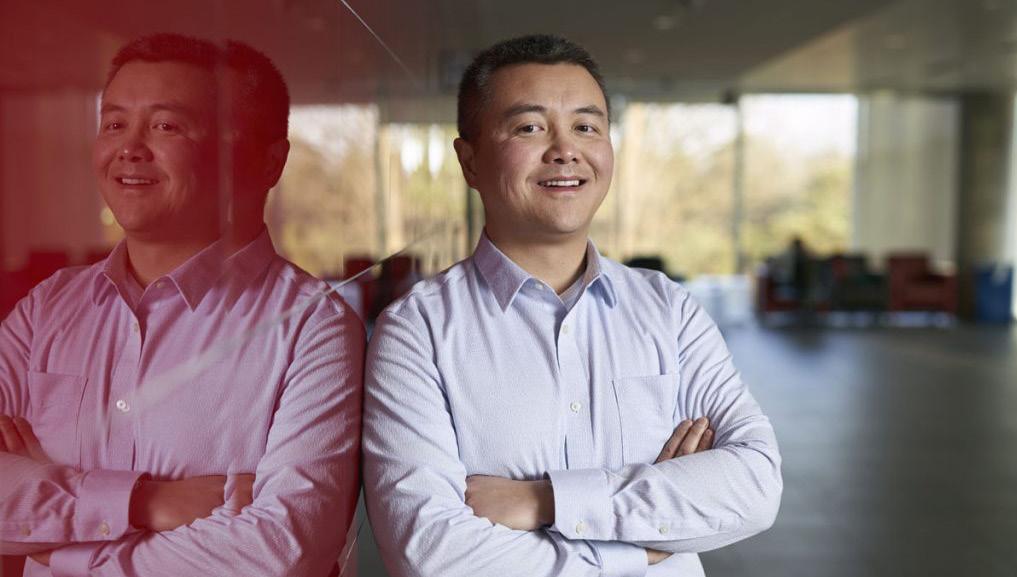
Daved Barry is a Professor of Innovation at Clarkson University, Potsdam, New York. He was the Fulbright Canada Distinguished Research Chair at the Sprott School of Business during the 2021-2022 academic year. We recently chatted with Daved to learn more about his experience at Sprott, the research that he worked on, and how the pandemic impacted his plans.
How did you decide to apply for the Fulbright program? It all started back in 2017. I had been living in Scandinavia for quite awhile having left the USA in 1993. I spent time working in New Zealand and Europe and I was in Sweden where I was a faculty member at Jonkoping University when the then-Dean of the School of Business at Clarkson University recruited me back to the USA. I have had several colleagues who have been Fulbright Scholars and they were encouraging me to apply. The Dean at Clarkson University also encouraged me and told me how much she loved Ottawa and had a place up there. I came to Ottawa and met with a few faculty members at Sprott to talk about potential research collaborations, but it was with Troy Anderson that the research ideas really clicked and a partnership started to form.
Can you tell us about your background and what you were hoping to achieve during your time as a Fulbright Chair?
I am known for arts and design-based approaches to innovation and for my work in building business studios. I have done that around the world and one of my papers, “Discovering the Business Studio,” won a few awards including the Roethlisberger Award for best contribution to management education. When I think
about a business studio, I think about an arts studio and enabling creativity and innovation. Coming into the Fulbright, I was interested in public sector innovation as I had only ever done business innovation prior to that. Since Ottawa is a predominantly government town, I had this idea of working with high-level government innovators. I would interview these innovators, whether they were innovating in policy or implementation of policy, and I would look at the narrative structures behind their successes and their failures. Troy is well connected in the public sector, so it seemed like a good research idea at the time.
Did your research plan follow through?
The COVID-19 pandemic did delay my plans and I did end up deferring the Fulbright by a full year. By the time I started in Fall 2021, there was not much happening in high-level government regarding innovation and there was not much access as people were busy and dealing with the effects of the pandemic. I was attending an innovation event at Kanata North and the thendirector suggested I look into community innovation. It is something I had not thought of before, but it is a very interesting area of the public sector and it is more grassroots with lots of interesting people.
How did you end up finding an organization to work with?

I was teaching a course at Clarkson University called Portraying Innovation, and I was experimenting, and I had my students do a documentary on student innovation at Clarkson University (this was the peak of COVID-19 and they had to do it all through Zoom). The students interviewed Clarkson University alumni who made all these inventions and commercialized them and were now living all over the world. I had never done anything like this in my life and it turned out really well. Documentary research is hugely different from any research that I have ever done. Normally I go into things and have a pretty good idea of what I can expect. With documentaries, you never know what it is going to be, and you are not going to know what the theme is going to be until you start looking at the footage.
I learned a lot in that experience. I was teaching the course again during my time as a Fulbright Chair and had the idea to try another documentary. I turned to my students for help, and they found The Laneway Project in Toronto, which ticked all the boxes in terms of grassroots
innovation and success. The founder of the project had this idea of flipping the laneways in the city, which were at the time dark, unsafe, and crime ridden. She wanted to make them community based, and community run and turned them into these public, beautiful spaces. We contacted the people that were running the Toronto laneway project, asked if they would be interested in doing the documentary and they said yes. So off we went with our student-led camera crew and started interviewing those involved with the project.
What were some of your key findings?
One of the biggest findings was methodological. When you are doing a documentary like this, it completely changes turning on a camcorder. And the reason for that, I think, is because people feel like it is a production and that creates a very different dynamic. They are prepping a lot more, thinking more about what they want to convey, and about their story and other people’s
stories. There is this high public visibility that is just never there in any other kind of research. And they are having to deal with studio lights and studio cameras and a crew of people handling these professional devices. I was not in front of the camera myself, but I could visibly see that this hugely transformed every single person that sat in the interviewee’s seat or when we were out in the field doing the interviews.
One of the professional documentary makers in Toronto that I was talking to said that we should ask the question, “What was most meaningful for you?” And as soon as you ask that question, everything changes as well. People become much more sincere, they become much more soul searching. There is this movement from showing up and trying to look good to suddenly just being genuine and diving into it and we noticed those distinctions as well.
Methodologically, I was getting material that I never would have gotten any other way. Period. And I am still looking at it and analyzing it from a narrative perspective. I think that some of the stuff that is pretty cool is that if you are looking at grassroots public sector innovation, you need to have this “Joan of Arc”-type character who is almost critical to making the innovation work. The founder of The Laneway Project had to constantly adapt when collaborating with different communities from all socio-economical backgrounds. From dealing with active resistance to speaking with policymakers and having to constantly change her style. It was a very different approach than the government sector.
How was your experience working with Sprott and our faculty?
The whole experience has been really great. From the research side, having somebody who wanted to continue to work together who had the same interests was really critical and I have found that with Troy. He has really been the gateway to everything and so generous with his time. What we are looking at right now is this whole intersection between place-based and creative experiential teaching. We both do that quite a bit and I have a formal studio set-up whereas Troy is having to improvise a lot. We are looking into co-writing an article about it for a journal. I did not know what to expect going into the Fulbright and there were lots of hurdles to jump through with residency requirements and COVID delays, but I am really happy with the whole Carleton University connection and what we were able to achieve with the research.

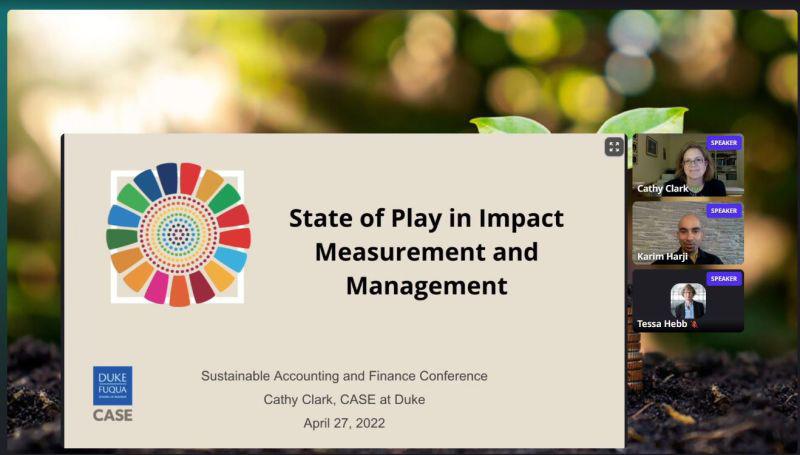
On April 27 and 28, 2022, the Sprott School of Business hosted an inaugural two-day conference on Sustainable Accounting and Finance. The theme of the conference, “Data-driven investments,” focused on the critical role of sustainability in our financial world. The event combined a peer-reviewed academic conference with leadingedge research and a practitioner-focused conference with speakers and panelists from industry. Holding the conference virtually was particularly beneficial as participants were able to connect from across the globe. Keynote speakers included Dr. Ben Caldecott, founding Director of the Oxford Sustainable Finance Group at the University of Oxford, and Dr. Cathy Clark from Duke University, one of the top twenty women in the USA working in social innovation.
“This conference is not just an opportunity for us to bring together renowned academics and industry leaders to share knowledge and best practices with each other, but it’s also an opportunity for us to teach our students about a concept that is absolutely core for their future careers in business,” Tessa Hebb, distinguished Research Fellow with the Carleton Centre for Community Innovation and one of the organizers for the conference.
The Black Entrepreneurship Knowledge Hub (BEKH), coled by Carleton University’s Sprott School of Business and the Dream Legacy Foundation, hosted a two-day symposium, “Researching Black Entrepreneurship in Canada,” on November 17 and 18, 2022. The event brought together academic and community researchers from across the country, both in person and virtually, to explore topics important to setting BEKH’s research agenda. Gerald Grant, BEKH co-lead and Sprott Professor, Information Systems, identified the symposium’s goals during his opening remarks. These included defining the research agenda for BEKH by identifying gaps and under-explored topics concerning Black entrepreneurship and receiving contributions to guide the development of the large-scale quantitative, qualitative, and network mapping studies.
The symposium kicked off with a keynote by Natalie Evans-Harris, Executive Director of US-based Black Wealth Data Centre, whose mission is to empower practitioners and policymakers with reliable data needed to make decisions that help repair the harm caused by decades of racism and divestment.
“Why is data considered a commodity if it can’t be used by everybody? I’m focused on how we make data usable by everybody. Because if you get it into the right hands of the right people at the right time— transformation happens.”
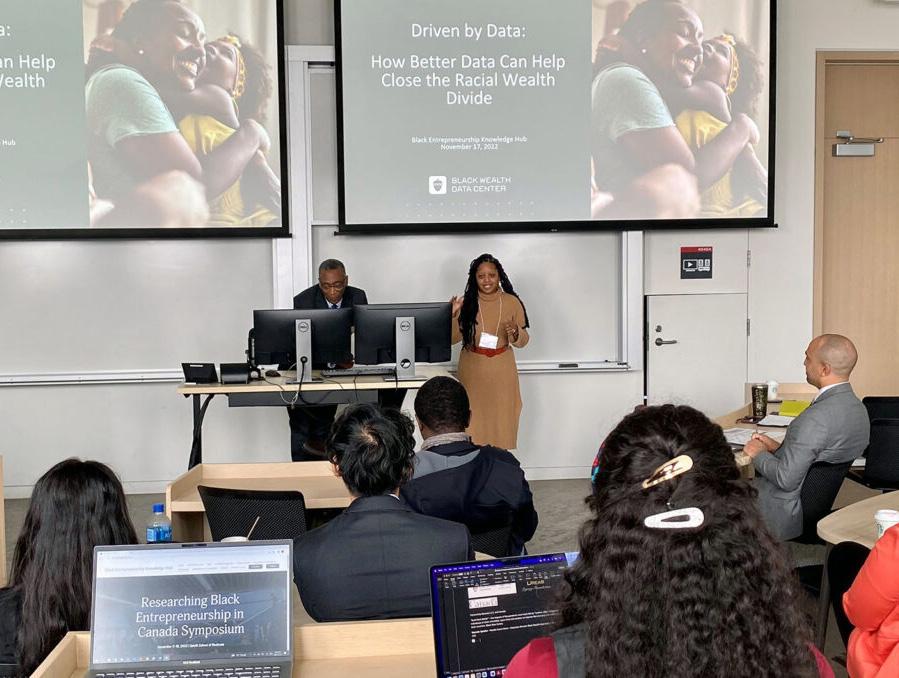 Sustainable Accounting and Finance Conference
Sustainable Accounting and Finance Conference

Mohamed Al Guindy is an Assistant Professor, Finance, at the Sprott School of Business. Mohamed’s research on “Dynamic Networks in Financial Markets” will construct a dynamic network view of the economy based on social media discussions and use this network view to study the diffusion and propagation of shocks, such as COVID-19. This research explores how shocks propagate in the economy and which firms or clusters of firms are most central. Through his research, he aims to focus on these dynamic networks with particular emphasis on the connections between and among firms, how these connections form and fade, and what a large shock does to the economy or an industry.
This award is administered by the Office of the Vice-President, Research and International, and selected by a committee of past recipients. It provides ten faculty members across campus with funds in support of a research project.

Alan Cai is a Professor, Supply Chain Management, at the Sprott School of Business. Alan’s research interests include three main streams: 1) Supply chain management; 2) Quality management; and 3) Environmental management. His research focuses on the relationships between business partners in the supply chain process and the social influences that are embedded into supply chain decision-making. This research will contribute to better understanding of how to develop, maintain, and grow supplier interactions.
The Carol-Ann Tetrault Sirsly Research Award was established by the Sprott School of Business in memory of Carol-Ann and the foundational role she played in the Sprott community. This annual recognition is presented to a Sprott faculty member for exemplifying quality in research.
Mohamed Al Guindy, Assistant Professor, FinanceFulbright Canada has established a unique 25-year commitment with Carleton University to support collaborative scholarship between researchers from the United States and Canada. The Sprott School of Business will host one of four Carleton Visiting Chair opportunities through a series of one-year appointments from 2018 through 2043.
The Sprott School of Business welcomed Daved Barry and Sahn-Wook Huh as the 2021-2022 visiting Fulbright Canada Distinguished Chairs in Entrepreneurship.

Daved Barry is the Gates Professor of Innovative Business Culture at Clarkson University. Previously he was Professor of Innovation at Jönköping University (Sweden), Professor of Creative Enterprise Design at the Copenhagen Business School, Banco BPI Chair in Creative Organization Studies, Nova University (Portugal), and Victoria University Chair of Creative Organization Studies (New Zealand). He completed his PhD in Strategic Management and Organizational Psychology at the University of Maryland (1986). Daved’s teaching and research focus on how design, the arts, and studio methods can improve innovation, leadership, organizing, and problem solving. He has numerous publications in the world’s top management journals, and his paper, “Discovering the Business Studio,” was given the 2016 Roethlisberger Award for best contribution to management education by the Organizational Behavior Teaching Society.
Sahn-Wook Huh is an Associate Professor of Finance at Buffalo School of Management, SUNY. Before and after his MBA studies at the University of Chicago, he worked for several years in the private and government sectors. With his extensive real-world experience, he returned to academia for PhD studies at the Anderson Graduate School of Management at University of California, Los Angeles.
Sahn-Wook’s research interests are empirical corporate finance, market microstructure, asset pricing, evaluation of mutual fund and hedge fund performance, and behavioral finance. His research articles appear in prestigious journals such as: Review of Financial Studies; Management Science; Journal of Financial and Quantitative Analysis; and Review of Asset Pricing Studies. Sahn-Wook’s research articles have won the “Best Paper” awards at nine US and international conferences, including the 2021 Award at the Financial Management Association (FMA) Annual Conference held in Denver. He received the Milton Plesur Excellence in Teaching Award, which is a universitywide award bestowed upon faculty members who are outstanding in teaching, at the University of Buffalo. Sahn-Wook recently served as the President of the Korea-America Finance Association (KAFA).

Each year, Sprott researchers apply for external research support from a variety of funders, including the Social Sciences and Humanities Research Council (SSHRC) and Mitacs. Several of these funding opportunities include partner organizations outside of Carleton University and involve direct collaboration in the research. Please see below for a list of research projects funded in 2022 by external funding agencies’ various programs.
Principal Investigator(s)
Title Funding Agency Program
Troy Anderson Water Conversations and Knowledge Exchange with the Na Cho Nyàk Dun First Nation: A Communitybased Approach
Gerald Grant Black Entrepreneurship Knowledge Hub
Partner Organization
SSHRC Partnership Engage Na Cho Nyàk Dun First Nation
Sana Mohsni Board Gender Diversity and Firm Environmental Social and Governance Ranking: Evidence from Canada
Luciara Nardon Enhancing Labor Outcomes Through Sectorspecific Initiatives
Isaac Otchere Sustainable Investing and Sustainability of Pension Funds
Principal Investigator(s)
Innovation, Science and Economic Development (ISED)
Black Entrepreneurship Program
SSHRC Partnership Engage
Dream Legacy Foundation
Millani Inc
Immigration, Refugees and Citizenship Canada (IRCC)
Settlement Program Service Delivery Improvement
SSHRC Partnership Engage
World Skills Employment Centre
CBC Pension Plan
Title Funding Agency Program
Mohamed Al Guindy Exploring Robo-news in Financial Markets: An A.I. Approach
Mohamed Al Guindy Dynamic Networks in Financial Markets
Troy Anderson Ankosé: Connected Technology for Pedagogical Communication with Remote Communities
SSHRC Insight Development
Canada Foundation for Innovation (CFI)
John R. Evans Leaders Fund (JELF)
eCampus Ontario Virtual Learning Strategy (VLS)
Merridee Bujaki
A Multimodal Analysis of Social Reporting: A Comparative Case Study of Rio Tinto Group in Canada and Australia
CPA Canada - CAAA Management Accounting, Performance Management, Finance, Governance & Strategy Research Grant
Rick Colbourne
Decolonizing Education: Disrupting and Transforming Racist and Colonial Practices in Postsecondary Graduate Business Programs
Spencer Foundation Racial Equity Special Research Grant
Maryam Firoozi
Towards Accountability for Artificial Intelligence
Daniel Gulanowski International Students and Workforce Integration Through Technology: The Future of Canada's Prosperity
Frank Jiang
Internationalization and Board Gender Diversity in Multinational Enterprises
SSHRC
SSHRC
Insight Development
Insight Development
Leanne Keddie
Sustainable Accounting and Finance Conference
Leanne Keddie Waste? Know More! Igniting Behaviours for Circularity in the Food Supply Chain
Sana Mohsni BGD and ESG Performance and Disclosure: The Case of Canadian Mining Companies
Kate Ruff
The Common Approach to Impact Measurement: Connecting the Standards
SSHRC
Insight Development
SSHRC
SSHRC
Connections
Imagining Canada’s Future Ideas Lab
CPA Canada -CAAA Management Accounting, Performance Management, Finance, Governance & Strategy
ESDC
2021 Investment Readiness Program
Greg Sears
Promoting Retention, Inclusion, and Integration of International Graduates
SSHRC
Insight
Carleton University Sprott School of Busines s
In addition, Sprott researchers have access to several Carleton University administered research funding opportunities. These opportunities are available through a variety of Carleton offices such as Office of VicePresident (Research and International), Carleton International, and SSHRC Institutional Grants (SIG). The Sprott School of Business research centres, such as the Centre for Research on Inclusion at Work (CRIW), also offer small research grants to support members. Please see below for a list of research projects funded in 2022 by internal calls for proposals.
Principal Investigator(s) Title Funding Agency Program

Mohamed Al Guindy Dynamic Networks in Financial Markets Carleton Research Achievement Award
Lindsay McShane Chatbot or Live Agent? The Effects of Relational Value Threat on Consumer Receptivity to Chatbots
Andrew Webb How Experiential Learning Can Lead to Successful Transitions to Leadership Roles for International MBA Students
SSHRC Explore
CRIW Ignite!
New immigrants looking to join Canada’s labour market face a myriad of challenges. Vivi (Hui) Zhang, PhD, Management candidate at Carleton University’s Sprott School of Business, examines the barriers they face, as well as the support available, with the goal of improving the professional integration of newcomers to Canada.
What have you found to be the biggest challenges facing immigrants trying to integrate themselves into the Canadian workforce?

I think that would be the lack of knowledge about the Canadian labour market, such as job search processes or workplace norms and cultures, or access to social networks. As an example, many immigrants in my study reported benefiting from the support of mentors in tailoring their resumes and cover letters to the industry standard, practicing job interviews, and understanding the hiring process within organizations. Without contextual knowledge and networks, many skilled immigrants have difficulty finding employment commensurate with their skills and qualifications, and experience downward occupational mobility, such as working in so-called “survival jobs.”
You are specifically looking at how mentorship programs run by newcomer support organizations aid immigrants in finding jobs and developing their careers in Canada. How valuable is mentorship to the newcomer experience?
Career development researchers widely recognize the benefits of mentoring. Mentored individuals report more job satisfaction and greater career advancement prospects than their non-mentored counterparts. While limited, an emerging body of research has demonstrated the promises of formal mentoring for the integration of newcomers, including refugees and immigrants.
“I have been studying immigrant integration for years, and I can honestly say that Vivi’s work is going to make a huge impact to the services that are available for new immigrants,” comments Luciara Nardon, Vivi’s research supervisor and Professor, International Business, Sprott School of Business. “The field is lucky to have such a star in it.”
Vivi recently sat down for a Q&A about her work.
How did you become interested in this area of research?
Immigration is critical to Canada’s economic and social development. Yet, many newcomers encounter challenges finding commensurate employment and face disruption in their career development. I became interested in this area of research because of my personal experience and my aspiration to make a positive impact on newcomers’ integration in the country.
In my study, mentorship programs connect immigrants with experienced professionals working in the field who have in-depth knowledge about the profession and can provide guidance on how to succeed in the job market. Through mentorship programs, immigrants get to build their professional networks, obtain a better understanding of the labour market, and harness the skills and confidence that are necessary for labor market integration. Mentorship programs help immigrants better prepare for a successful job search while enhancing their self-efficacy, which together increase their job readiness.
You mentioned that one of the practical outcomes you are hoping for from this project is to highlight the limitations of these mentorship programs so that we can learn how to better support them. What are some of the limitations you have discovered?

Mentorship programs rely heavily on volunteer mentors who are willing to contribute their time and energy to support immigrants. However, sometimes depending on the availability and expertise of mentors, the matching of mentors and mentees was not a good fit, leaving gaps in addressing the needs of mentees. Additionally, while mentorship programs have the potential to expand immigrants’ professional networks, many immigrants noted that it was difficult to maintain contact with people introduced to them during the mentorship program. Support organizations need to facilitate better mentor-mentee matching and create more trust-building activities throughout mentorship programs.
You have also been involved with many other research projects about internationally mobile workers, with five papers being published in academic journals. One topic you researched was the challenges faced by immigrant women integrating into the workforce. What are some of these challenges?
Together with my co-authors, we explored the employment experiences of skilled immigrant women in Canada during the COVID-19 pandemic. Many immigrant women in our study experienced
Through mentorship programs, immigrants get to build their professional networks, obtain a better understanding of the labour market, and harness the skills and confidence that are necessary for labor market integration
layoffs, reduced employment opportunities, and challenges maintaining their current positions. The pandemic unfortunately placed an increased strain on skilled immigrant women who need to care for their families and seek commensurate employment in a predominantly online work environment, limiting their access to social capital and support.
How has your relationship with your supervisor supported you in your journey?
Luciara has given tremendous support throughout my doctoral study. She involves me in research projects where I get to collaborate with scholars with different areas of expertise and advises me on how to best leverage coursework and conferences to develop my research ideas. More importantly, I appreciate that she is always there for me at various stages of the journey, “rain or shine.”
What have you enjoyed the most about Sprott’s PhD in Management program?
My overall experience at Sprott has been incredibly positive. Not only was I given many opportunities to contribute to research projects that are well aligned with my research areas, but I have also been supported by my thesis supervisor, fellow PhD students, and the broader Sprott community.
My peers and senior PhD students were an important source of emotional and informational support at the early stages of the PhD program, when I was new to research and teaching. I appreciate the guidance provided by my comprehensive exam and thesis proposal committees, which have been invaluable to building a strong foundation for my dissertation research. As I am getting closer to the finish line, having these supports around me keeps me motivated and hopeful for the future.
Liam Hoselton is a proud graduate of Carleton University, receiving two degrees from the Sprott School of Business: A Bachelor of International Business and an MSc in Management. He graduated from the latter after successfully defending his master’s thesis, “An Exploration of Transcultural Othering in the Print Media: Asian Communities During COVID-19 in Canada and the US,” (supervised by Luciara Nardon, Professor, International Business). We sat down with Liam to find out what drew him to the program and where he hopes his degrees will take him.
What attracted you to Sprott’s MSc in Management program?
Originally, I was accepted into a program in Europe, but because of the uncertainty with the COVID-19 pandemic, I decided to stay closer to home. I had worked for Professor Nardon as her research assistant for three years prior to starting the master’s program. She was the one who encouraged me to apply as it would be an excellent program for me to become a more advanced researcher. She also explained that there were applications to the program from beyond business, and after having completed the program, I can truly say that it is well suited for multi-disciplinary interests.
All the teachers were excellent, and all the courses were student-driven, meaning students drive the
conversations, which encourages much more engagement. Professor Hayibor taught Foundations of Management Theory & Research (BUSI 5980), which really gave me a good sense of different theoretical frameworks and research methodologies that extend beyond business into the social sciences and how you can apply them to business and intergroup relations. I also took an elective course outside of Sprott called, Political Psychology and Intergroup Relations. I was fortunate that Sprott allowed me to take a course within another department as I found the course to be very insightful for my research.
What is your research interest?
I am extremely interested in using my research to solve issues related to intergroup conflict and discrimination. My master’s thesis was about how the media contributed to the othering and discrimination of Asian communities during the COVID-19 pandemic. From a cross-cultural management perspective, it is very important to understand how we differentiate groups and identities and how that might lead to issues when it comes to diversity and inclusion.
What impact are you hoping your research will have in this area?
I personally would like to see a world where we are not in conflict with one another and where people do not hate each other. I think that one of the things that will prevent us from solving that issue is the fact that we cannot figure out how to get along or be able to get into a room and agree on an approach to solve these issues. I want to figure out how to increase social cohesion between groups and between individuals and make them realize that we are not all so different from one another; that we can find common ground and mutual respect. We are all just trying to make it through our lives, day by day.
Since graduating, I have five years of research experience. I am in a unique position where transitioning into the master’s program was not a huge leap from what I was doing before because I had all this prior experience in terms of research. The biggest recognition was that before this program I was helping with research but did not fully comprehend why we were doing certain things within the research. This program has given me a better theoretical understanding of how to conduct research. I think that the thesis itself has been incredibly beneficial because it is my first approach at doing a solo research project. Despite myself coming from a research background, many of my colleagues in the program do not have this and have not been negatively impacted.
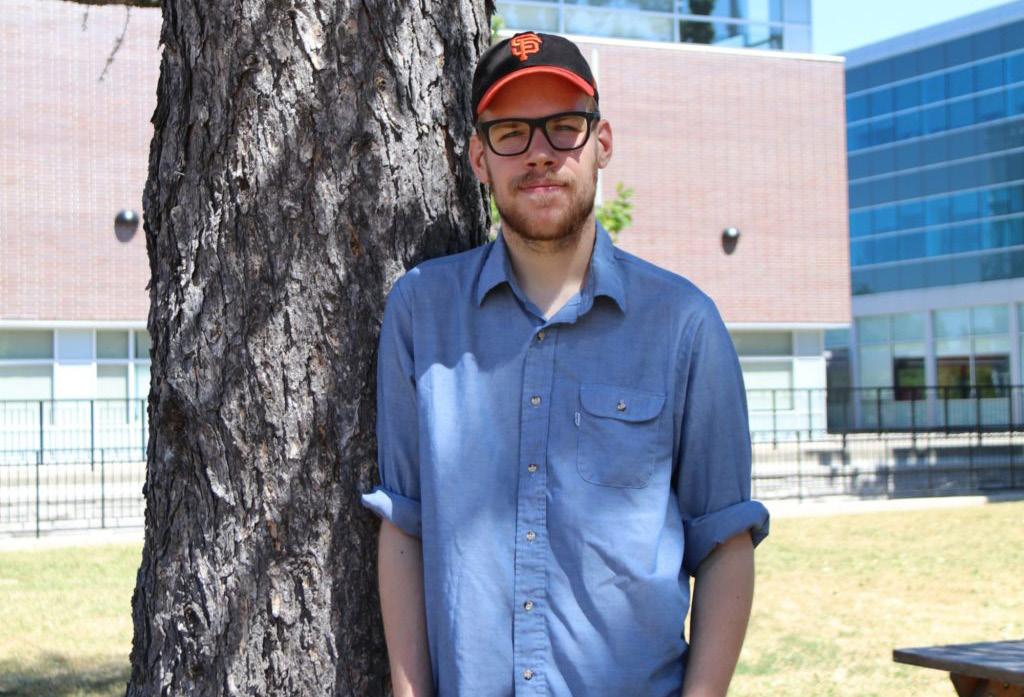
The biggest thing is that it is important to find the right supervisor that will be in your corner and will support you. I have that relationship with Luciara. I know that no matter what, she will back me up and provide meaningful feedback to help me improve—I believe that to be the most key factor.
Also, if you are interested in the social sciences, the master’s program at Sprott is an excellent program. From this program you can go into any kind of PhD or research position. Of course, there is a lot of focus on business, but it gives you all the basic theories you need to know to be a social sciences researcher. And if you are interested in presenting at conferences, Carleton University provides excellent opportunities to get involved.
I am looking at doing a PhD in Political Science, specifically in Defence and Security Studies. Long-term
I would like to become a professor or policy analyst. I am specifically interested in the regulations around social media companies in preventing online radicalization. I think overall this MSc has provided me with a lot of insight into the world of business and social sciences. In terms of addressing my research interest needs regarding intergroup conflict, it requires a very multidisciplinary approach and this program was one that could provide that platform for me.
Since graduating, I completed the Camino de Santiago, walking 280 km from Porto to Santiago de Compostella. I also circumnavigated the globe and visited twenty-four countries in the span of three months. It was a lifechanging experience that I hope will serve me well in my PhD studies.
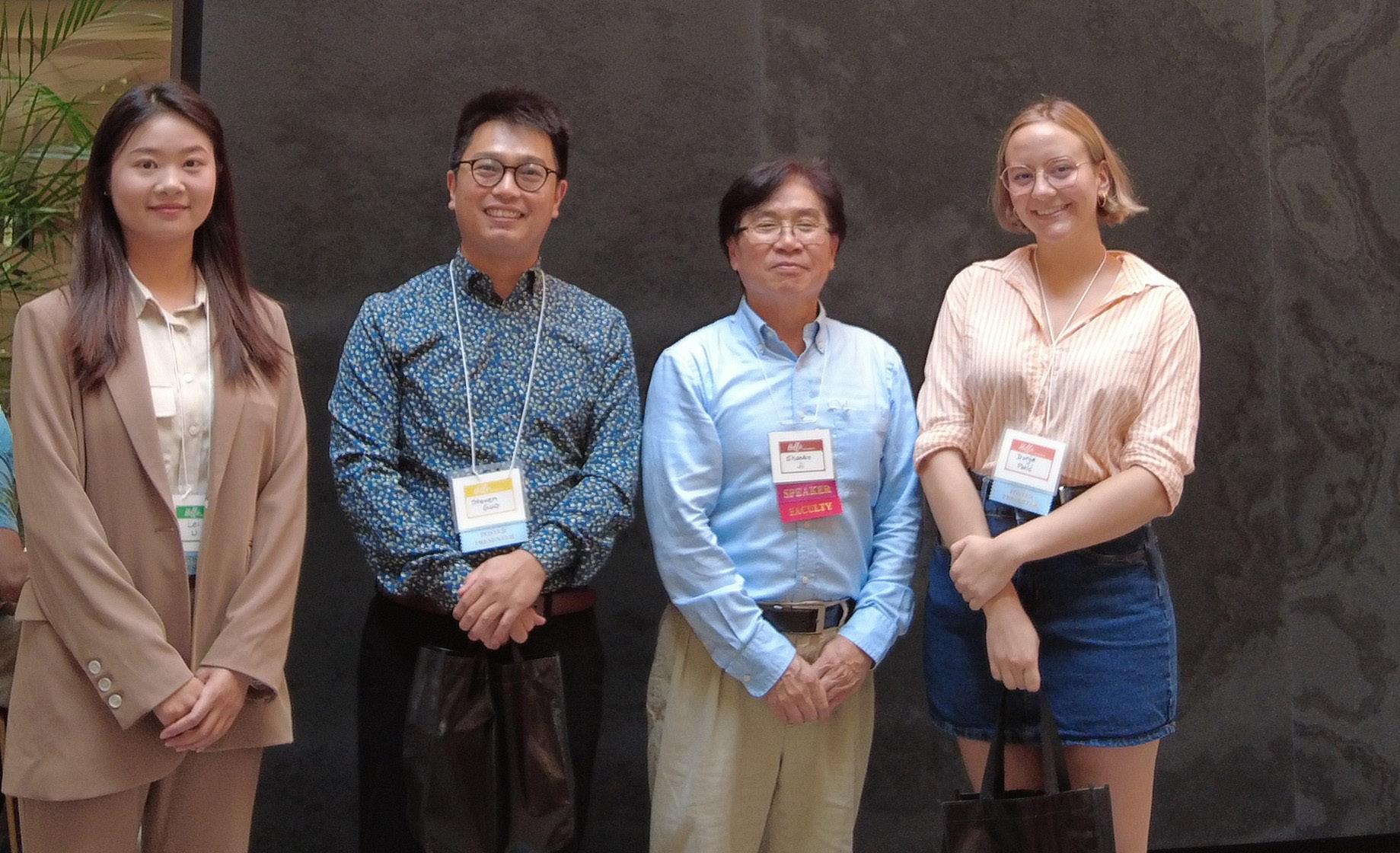
The inaugural Sprott Graduate Research Student Poster Competition took place in the lobby of the Nicol Building on Friday, September 9, 2022. Faculty and students spent the afternoon chatting with contestants about their research before voting for their favourite poster.
The Sprott Graduate Research Programs office hosted the inaugural Graduate Research Student Poster Competition in early September 2022. Excited guests—including Sprott faculty, staff, and PhD and MSc students—filled the atrium of the new Nicol building; all gathered to meet one another and learn about the graduate students’ innovative research. The competition was an especially momentous occasion as it marked the first time that many of the students had seen each other in person since the start of the COVID-19 pandemic.
Months in the making, the event was the brainchild of Tasnuva Chaudhury, PhD candidate and former Graduate Research Programs’ Student Society President:
“I proposed the idea of hosting the poster competition to provide “Sprotties” with an opportunity to present their research and engage in conversations with faculty and a wider audience. It proved an excellent learning experience for those students who had never prepared a research poster before. In the wake of the pandemic, students were keen to connect in person and there could not be a better way to do that than to meet and share research in our new Nicol building.”
Tapping into the rich resource of the Sprott graduate programs (with over eighty PhD students and a growing MSc student base), Leighann Neilson, Associate Professor, Marketing, and Academic Director of the MSc and PhD Programs, also recognized the opportunity to host such an event given the many months students spent online and therefore their excitement to finally meet in person and participate in a fun and rewarding experience:
“Given that this was our first attempt at organizing a poster competition for our students, I was not sure what to expect. I was thrilled with both the number and the quality of the posters presented. I think additional credit must go to the Research Office for hosting a workshop that helped the students create their research posters. Moreover, our students benefitted from having faculty and their colleagues provide valuable feedback on their research in progress. I hope we can turn this event into a time-honoured tradition.”
On the day of the competition, posters lined the walls as guests mingled and spoke to students about their research. A panel of judges awarded the “Best Poster” to Dunja Palic, second-year PhD candidate (supervisor, Dr. Luciara Nardon). Dunja’s poster, titled: “Transnational Sensemaking Narratives of Highly Skilled Immigrants’ Career Change,” clearly demonstrated her valuable research examining the barriers highly skilled newcomers face when immigrating to a new country and attempting to work in their preferred professions.
Those in attendance also had the chance to cast their vote for the “People’s Choice Award.” The research posters were so popular that there was a three-way tie— PhD candidates Dunja Palic, Steven Guo, and Lei Li all took home the coveted prize!
With the success of the inaugural competition, Sprott looks forward to hosting this event every fall to welcome new students and celebrate the achievements of the graduate students in the program.
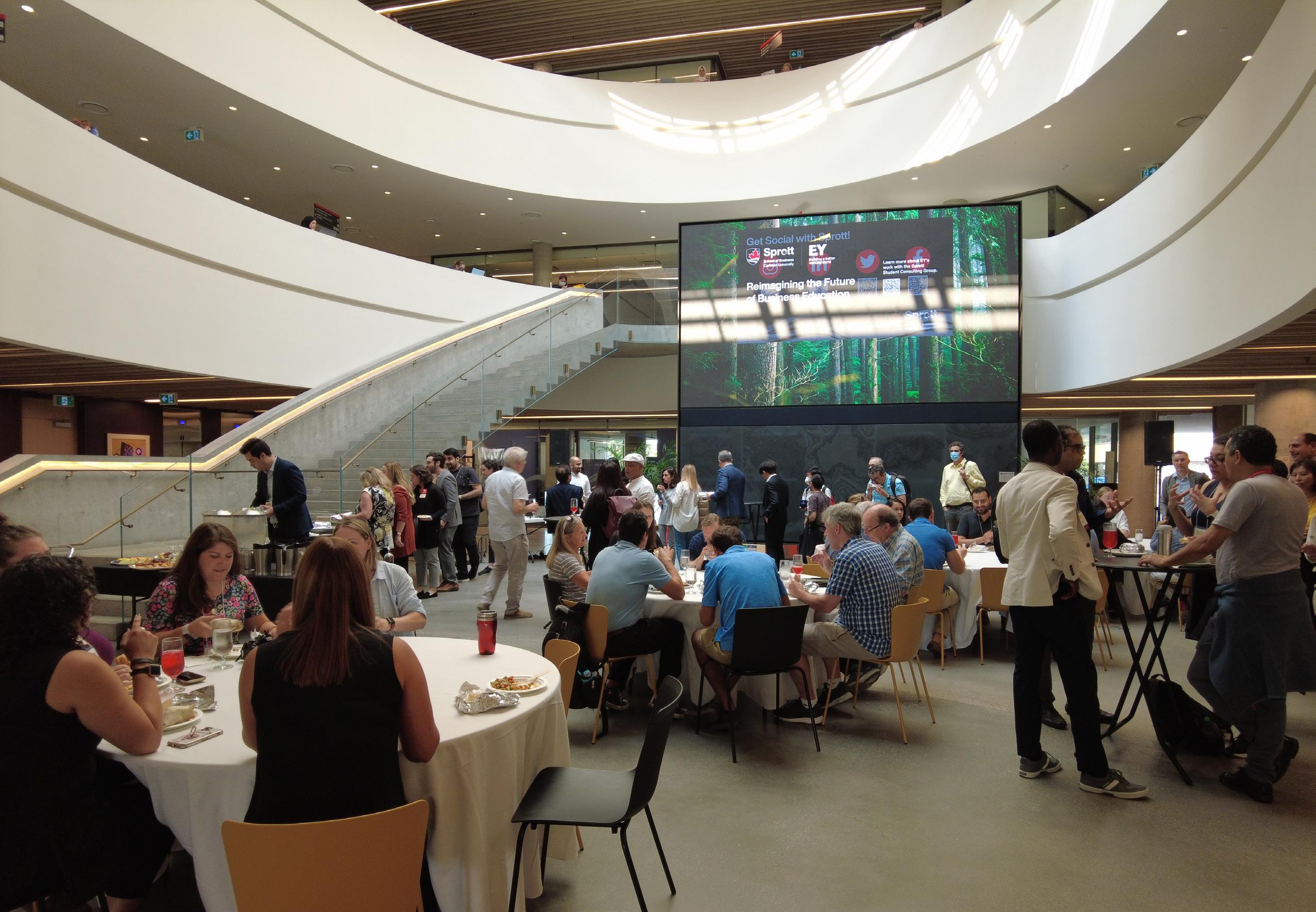
We are pleased to support undergraduate student involvement in research projects through our faculty’s participation in the Internship-Carleton University Research Experience for Undergraduate Students (I-CUREUS) and the Sprott School of Business Summer Undergraduate Research Internship. Both programs provide research opportunities to engage students in their undergraduate years that may inspire them to continue into graduate studies.
• Elisa Zheng (Bachelor of International Business) – Supervisor: Daniel Gulanowski
• Nicole Gluzman (Bachelor of Commerce) – Supervisor: Leanne Keddie
• Ellena Damini (Bachelor of Commerce) – Supervisor: Leanne Keddie

• Sasha Valgardsson (Bachelor of International Business) – Supervisor: Leighann Neilson
As a recent graduate from the Bachelor of International Business program with an interest in MSc programs, having had the experience to work firsthand with Dr. Leighann Neilson during the Sprott Summer Undergraduate Research Program was invaluable to my growth both within the world of academia and outside of it. This program allotted me the incredible opportunity to enhance my academic research skills, learn a new software (NVivo), gain insights that will support me in my future projects, and develop a wonderful relationship with Sprott researchers, especially Dr. Leighann Neilson.
The research project that I was involved with was part of a larger project involving faculty and students from Sprott School of Business (Merridee Bujaki, Francois
Brouard, and Leighann Neilson) and faculty from Telfer School of Management (Sylvain Durocher), and Nipissing University (Alisher Mansurov). Prior to my joining, the research team had been examining the recruitment documents of professional accounting firms to assess whether they meet the firms’ equity, diversity, and inclusion (EDI) goals. Specifically, we were looking at how the text and visual elements (people in the photos, graphics, etc.) demonstrate how these accounting firms are (or are not) living up to their EDI goals.
Our research examined how post-secondary students, including potential employees of public accounting firms, perceived select photographs from the recruitment website of a Big Four public accounting firm. We surveyed accounting/business students and gathered their written observations and interpretations of three photographs seen in previous research as conveying messages related to EDI. At this point, the research team had analyzed the data in two ways: 1) An accounting student research assistant used an Excel spreadsheet to record and classify informants’
comments regarding the content and meaning of the elements in the recruitment ads, and 2) A faculty member, familiar with data analytic techniques, used text analytics and natural language processing (NLP) methods to identify topics included in student responses and sentiments expressed through their choice of language. My role as a summer research intern stemmed from the question: Would there be significant differences in interpretation resulting from the type of analysis process we used?
I kicked off the internship by spending a lovely amount of time with our librarians to learn NVivo, a qualitative data analysis (QDA) software. By learning critical visual analytic techniques and how to use QDA software, I was able to support the existing research group by making a methodological contribution. With the addition
This research plays an important role in advancing diversity, equity, and inclusion in accounting and informing marketing practitioners on how to craft compelling advertisements of EDI.

of my work this summer, we are now able to compare three different methods of analysis and interpretation of visual data. With the increasing prominence of using artificial intelligence and NLP in research, it is important to determine whether these methods replicate traditional analysis methods (such as my work this summer) or if they take us in new directions.
Using both text analytics and NLP, we were able to examine students’ responses to identify topics, evaluate sentiment, and assess other semantic aspects. Our investigation reveals what students view as the most prominent features of these recruitment photographs, the meanings they discern from the photographs, and how they perceive diversity and inclusion. We were then able to analyze how results differ by students’ immigration position, minority status, gender, and other characteristics. This research plays an important role in advancing diversity, equity, and inclusion in accounting and informing marketing practitioners on how to craft compelling advertisements of EDI. Overall, working on this research project alongside experienced researchers in the Sprott community was an exceptional opportunity. I had the chance to work both independently on the research while being a part of a very collaborative research team that created such a positive and supportive environment throughout the program—the best of both worlds. The experience has provided me with a confidence to perhaps pursue my own research one day and has certainly encouraged me to consider future graduate studies. In the meantime, the skills and insights gained through this experience will serve me well until the next best thing.
Al Guindy, M. (2022). Fear and hope in financial social networks: Evidence from COVID-19. Finance Research Letters, 46 (A), 102271.
Brouard, F., & Choquette, E. (2022). Humour: des repères de définition. Sérieux? Humour: Savoirs et pratiques, 1 (1), 9-20.
Bujaki, M., & McConomy, B. (2022). Internal controls, labour processes and work at the Isthmus Lockstation, Rideau Canal, 1832–1854: Discipline and governmentality at a distance. Accounting History, 1-28.
Couchoux, O., & Maslch, B. (2022). How Firms’ Quality Experts Shape Canadian Public Accountability Board Inspections and Their Outcomes: An Analysis of Intraprofessional Conflicts, Third-Party Influences, and Relational Strategies. Contemporary Accounting Research, 39 (2), 757-88.
Farivar, S., Golmohammadi, A., & Ramirez, A. (2022). Analytics Capability and Firm Performance in Supply Chain Organizations: The Role of Employees’ Analytics Skills. Analytics, 1 (1), 1-14.
Isabelle, D., & Westerlund, M. (2022). A review and categorization of Artificial Intelligence-based opportunities in wildlife, ocean and land conservation. Sustainability, 14 (4).
Lanctot, A., & Duxbury, L. (2022). It may be urgent but is it important? A look at home employees evaluate their emails. Canadian Journal of Administrative Sciences.
Lanctot, A., & Duxbury, L. (2022). Measurement of Perceived Importance and Urgency of Email: An Employees’ Perspective. Journal of Computer-Mediated Communication, 27 (2), 1-24.
Li, S. (2022). Spillovers Between Bitcoin and Meme Stocks. Finance Research Letters, 50, 103218.
Lu, Q., Gus, F., Zhou, W., Wang, Z., & Ji, S. (2022). Mobile social recommendation model integrating users’ personality traits and relationship strength under privacy concerns. Systems, 10 (6), 1-25.
McIntyre, M. (2022). Capital Structure in an Option Theoretic Setting. SN Business and Economics, 2 (109), 1-24.
Rojas-Mendez, J., & Khoshnevis, M. (2022). Conceptualizing nation branding: the systematic literature review. Journal of Product and Brand Management, 42 (1), 107-123.
Smith, C. J., Schweitzer, L., Launch, K., & Bird, A. (2022). “Well, actually”: Investigating mansplaining in the modern workplace. Journal of Management and Organization, 1-9.
Tasnim, Z., Shareef, M. A., Dwivedi, Y. K., Kumar, U., Kumar, V., Malik, F. T., & Raman, R. (2022). Tourism Sustainability During COVID-19: Developing Value Chain Resilience. Operations Management Research
Ben Amar, W., Bujaki, M., McConomy, B., & McIlkenny, P. (2022). Disclosure Transparency, Impression Management or Both? A textual analysis of board gender
diversity disclosures in Canada. Corporate Social Responsibility and Environmental Management, 29 (5), 1247-1265.
Bujaki, M., Lento, C., Butt, I., Anderson, N., & Ogima, C. (2022). A Systematic Literature Review of Indigenous Peoples and Accounting Research: Critical Indigenous Theory as a Step toward Relationship and Reconciliation. Accounting Forum.

Cai, S., Wang, X., Ma, Y., Zhou, X., & Yang, Z. (2022). Boundary spanner closeness to partner firm as relational governance in turbulent versus stable environments. European Journal of Marketing, 56 (1), 252-282.
Cleveland, M., Papadopoulos, N., & Laroche, M. (2022). Global Consumer Culture and National Identity as Drivers of Materialism: An International Study of Convergence and Divergence. International Marketing Review, 39 (2), 207-241.
Colbourne, R., & Parhankangas, A. (2022). Indigenous Entrepreneurship and Venture Creation: A Typology of Indigenous Crowdfunding Campaigns. Entrepreneurship, Theory and Practice.
Dang, V., Otchere, I., & So, E. (2022). Does the Nature of Political Connection Matter for Corporate Social Responsibility Engagement? Evidence from China. Emerging Markets Review, 52, 100907.
Dionisi, A., Smith, C. J., & Dupré, K. E. (2022). Weathering the storm alone or together: Examining the impact of COVID-19 on sole and
partnered working mothers. Journal of Community Psychology, 1-22.
Duxbury, L., Halinski, M., & Stevenson, M. (2022). Something’s gotta give: The relationship between time in eldercare, time in childcare, and employee well-being. Journal of Aging and Health, 34 (6-8), 1101–1116.
Farivar, S., & Wang, F. (2022). Effective Influencer Marketing: A Social Identity Perspective. Journal of Retailing and Consumer Services, 67, 103026.
Farivar, S., Wang, F., & Turel, O. (2022). Followers’ problematic engagement with influencers on social media: An attachment theory perspective. Computers in Human Behavior, 133, 107288.
Firoozi, M., & Keddie, L . (2022). Geographical Diversity Among Directors and Corporate Social Responsibility. British Journal of Management, 33 (2), 828-863.
Firoozi, M., & Ku, C. H. (2022). Corporate Accountability During Crisis in the Digitized Era. Accounting Auditing and Accountability Journal.
Firoozi, M., & Magnan, M. (2022). Audit Committee Members’ Proximity to Corporate Headquarters and Audit Fees. Managerial Auditing Journal, 37 (8), 1062-1090.
Gary, M., & McKay, R. (2022). Transparency and efficiency in building code review. The case of Ontario, Canada. Canadian Journal of Civil Engineering, 49 (9), 1471-1482.
Gulanowski, D., Nardon, L., & Hine, M. (2022). Online Discussion Forum And Pre-migration Information Seeking: An Affordance Perspective. Journal of International Technology and
Information Management, 31 (2), 110139.
Guo, F., Wang, Z., Ji, S., & Lu, Q. (2022). Influential Nodes Identification in the Air Pollution Spatial Correlation Weighted Networks and Collaborative Governance: Taking China’s Three Urban Agglomerations as Examples. International Journal of Environmental Research and Public Health, 19 (8), 4461.
Guo, F., Zhang, L., Wang, Z., & Ji, S. (2022). Research on determining critical carbon emission influencing factors and carbon reduction optimization strategies: applying GRA and improved STIRPAT model: Taking the Yangtze River Delta as an Example. International Journal of Environmental Research and Public Health, 19 (14), 8791.
Halinski, M., & Duxbury, L. (2022). When spouses contribute at home: The impact of spouse dependent care on role overload and stress in dualearner couples. Community Work and Family.
Han, Y., Gulanowski, D., & Sears, G. J. (2022). International student graduates’ workforce integration: A systematic review. International Journal of Intercultural Relations, 85, 163-189.
Han, Y., Sears, G., Dahr, W., & Wang, D. (2022). Facilitating cross-cultural adaptation: A meta-analytic review of dispositional predictors of expatriate adjustment. Journal of Cross-Cultural Psychology, 53 (9), 1054-1096.
Hari, A., Nardon, L., & Zhang, H. (2022). A Transnational Lens into International Student Experiences of the COVID-19 Pandemic. Global Networks, A Journal of Transnational Affairs.
Hawkins, R., & Neilson, L. (2022). Guest editorial: Introduction to the Special Issue on Archival Sources for Marketing and Advertising History Research. Journal of Historical Research in Marketing, 14 (2), 133-134.
Isabelle, D., Han, Y., & Westerlund, M. (2022). A machine-learning analysis on the impacts of the COVID-19 pandemic on small business owners and implications from Canadian government policy response. Canadian Public Policy, 48 (2), 322342.
Isabelle, D., Westerlund, M., & Sajuyigbe, V. (2022). Building legitimacy and distinctiveness on Nigerian-Canadian transnational firms’ websites. Africa Journal of Management, 8 (4), 505-526.
Jiang, G., Reuer, J., Southam, C., & Beamish, P. (2022). The impact of initial public offerings on SMEs’ foreign investment decisions. Journal of International Business Studies, 53, 879–901.
Kuzhabekova, A., & Nardon, L. (2022). Refugee students’ transition from higher education to employment: Setting a research agenda. Journal of Immigrant & Refugee Studies.

Leminen, S., Rajahonka, M., Wendelin, R., Westerlund, M., & Nyström, A. (2022). Autonomous vehicle solutions and their digital servitization business models. Technological Forecasting and Social Change, 185, 122070.
Li, S., Wenli, H., Zhen, Q., & Zhang, Q. (2022). Macro Disagreement and International Stock Markets. Journal of International Financial Markets, Institutions and Money, 81, 101659.
Lu, H., Cai, S., Liu, Y., & Chen, H. (2022). How GHRM impacts employee OCBE: the role of emotions and value discrepancy. International Journal of Manpower.
Lu, H., Xu, W., Cai, S., Yang, F., & Chen, Q. (2022). Does top management team responsible leadership help employees go green? The role of green human resource management and environmental felt-responsibility. Corporate Social Responsibility and Environmental Management, 29 (4), 843-859.
Mehrotra, P., Vyas, V., & Kumar, U. (2022). Impact of regulations on the performance of banks–a bibliometric analysis. Transnational Corporations Review.
Mohsni, S., Otchere, I., & Shahriar, S. (2022). Board gender diversity, firm performance and risktaking in developing countries: the moderating role of culture. Journal of International Financial Markets, Institutions and Money, 73, 101360.
Mohsni, S., Otchere, I., & Yamada, K. (2022). Passive trading and firm performance: A quasi-natural experiment using the TSE-OSE merger in Japan. Pacific Basin Finance Journal, 70, 101666.
Nardon, L., Hari, A., Zhang, H., Hoselton, L., & Kuzhabekova, A. (2022). Skilled immigrant women’s career trajectories during the COVID-19 pandemic in Canada. Equality, Diversity and Inclusion, 41 (1), 112-128.
Neilson, L. (2022). Accessing Primary Source for Marketing and Advertising History Research from Family History Websi. Journal of Historical Research in Marketing, 14 (2), 281-291.

Papadopoulos, N., & Cleveland, M. (2022). An international and crosscultural perspective on ‘The Wired Consumer’: The digital divide and device difference dilemmas. Journal of Business Research, 156, 113473.
Peredo, A., Abdelnour, S., Adler, P., Banerjee, B., Bapuji, H., Calas, M., Chertkovskaja, E., Colbourne, R., Continu, A., Evans, M., Hirsch, P., Osorio, A., Ozkazanc-Pan, B., Smircich, L., & Weber, G. (2022). We Are Boiling: Management Scholars Speaking Out on COVID-19 and Social Justice. Journal of Management Inquiry, 31 (4), 339-357.
Pilon, M., & Brouard, F. (2022). Accountability Theory in Nonprofit Research: Using Governance Theories to Categorize Dichotomies. Voluntas: International Journal of Voluntary and Non-Profit Organizations.
Pilon, M., & Brouard, F. (2022). Conceptualising Accountability as an integrated system of relationships governance, and information. Financial Accountability and Management.
Rojas-Mendez, J., & Kolotylo, J. (2022). Why Do Russian Consumers Prefer Foreign-Made Products and Brands? Journal of Global Marketing, 35 (3), 208-227.
Rojas-Mendez, J., Massi, M., & Gallito, E. (2022). Consumer Pandemic Animosity: Scale Development and Validation. International Marketing Review, 39 (6), 1417–1442.
Ruff, K., Nappert, P. L., & Graham, C. (2022). Impact valuations in social finance: emic and polyvocal stakeholder accounts”. Accounting Auditing and Accountability Journal, 36 (1), 295-322.
Sadavoy, J., Sajedinejad, S., Duxbury, L., & Chiu, M. (2022). The impact on employees of providing informal caregiving for someone with dementia. Aging & Mental Health, 18 (5), 1-7.
Sadavoy, J., Sajednejad, S., Duxbury, L., & Chiu, M. (2022). A Canadian national survey of informal employed caregivers of older adults with and without dementia: Work and employee outcomes. International Journal of Social Psychiatry, 68 (1), 183-195.
Shareef, M. A., Dwivedi, Y., Ahmed, J. U., Kumar, U., & Mahmud, R. (2022). Stakeholders conflict and private–public partnership chain (PPPC): supply chain of perishable product. International Journal of Logistics Management, 33 (4), 1218-1245.
Singh, A., Misra, S.C., Kumar, V., & Kumar, U. (2022). Identification and ordering of safety performance indicators using Fuzzy TOPSIS: A case study in Indian construction company. International Journal of Quality and Reliability Management, 39 (1), 77-114.
Smith, C. J., Dupré, K. E., & Dionisi, A. (2022). Sexual misconduct reporting: The silencing effects of hegemonic masculinity. Equality, Diversity and Inclusion.
Smith, C., Han, Y., Dupre, K., & Sears, G. (2022). Perceived organizational support and its interaction with voice on police officers’ organizational cynicism, stress, and emotional exhaustion. Policing: An International Journal, 45 (2), 200-217.
Szkudlarek, B., Nardon, L., & Toh, S. (2022). A temporal perspective on refugee employment – Advancing HRM theory and practice. Human Resource Management Journal.
Venis, R. A., Taylor, V., Sumayani, P., Laizer, M., Anderson, T., Basu, O.D. (2022). Towards a participatory framework for improving water & health outcomes: A case study with Maasai women in rural Tanzania. Social Science and Medicine, 301, 114966.
Wang, J., Cai, S., Xie, Q., & Chen, L. (2022). The influence of community engagement on seller opportunistic behaviors in e-commerce platform. Electronic Commerce Research, 22, 1377–1405.
Wang, Z., Chen, Y., Ren, S., Collins, N., Cai, S., & Chris Rowley (2022). Exploitative leadership and employee innovative behavior in China: A moderated mediation framework. Asia-Pacific Business Review.
Wang, Z., Cui, T., & Cai, S. (2022). How and when team reflexivity influences employee innovative behavior. Journal of Managerial Psychology, 37 (1), 61-75.
Wang, Z., Cui, T., Cai, S., & Ren, S. (2022). How and when highinvolvement work practices influence employee innovative behavior. International Journal of Manpower, 43 (5), 1221-1238.
Wang, Z., Cui, T., Cai, S., & Ren, S. (2022). Team reflexivity, individual intellectual capital and employee innovative behavior: A multilevel moderated mediation. Journal of Intellectual Capital, 23 (6), 1276-1295.
Wang, Z., Doren, C., Cai, S., & Ren, S. (2022). Enterprise level responses to environmental institutional pressure: Focus on legitimization strategies. Journal of Cleaner Production, 382 (1), 135148.
Wang, Z., Guan, C., & Cai, S. (2022). How authentic leadership affects green creativity: the role of selfreflection and psychological capital. Chinese Management Studies.
Wang, Z., Guan, C., Ren, S., & Cai, S. (2022). Workplace ostracism and team members’ creativity: The mediating role of self-reflection and moderating role of high involvement work practices. Journal of Management and Organization, 1-19.
Wang, Z., Meng, L., & Cai, S. (2022). Work reflection during leisure time and employee creativity: The role of psychological capital. Journal of Management and Organization.
Yang, Z., Zhu, N., Cai, S., & Sun, H. (2022). Understanding the differences between Chinese and Western business practices: insights into Confucian philosophy. European Journal of International Management, 17 (2-3), 180-197.
Ye, X., Cai, S., & Wang, Z. (2022). The effect of abusive supervision on safety behaviour of Chinese underground miners: a multi-level moderated mediation analysis. Chinese Management Studies, 16 (5), 11241144.
Ye, X., Cai, S., Li, X., & Wang, Z. (2022). How and when top management green commitment facilitates employees green behavior: a multilevel moderated mediation model. Chinese Management Studies.
Zhang, H., Nardon, L., & Sears, G. (2022). Migrant Workers in Precarious Employment: A narrative review. Equality, Diversity and Inclusion, 41 (2), 254–272.

Nardon, L., & Hari, A. (2022). Making sense of immigrant work integration: an organizing framework. Palgrave.
Tanev, S., & Blackbright, H. (Eds.), (2022). Artificial Intelligence and Innovation Management. World Scientific Publishing Europe.
Bujaki, M. (2022). The Academic Sabbatical as a Voyage of Discovery –What Really Counts. In Sibbald, (Ed.), The Academic Sabbatical: A Voyage of Discovery (pp. 185-204). Ottawa: University of Ottawa Press.
Tanev, S., Bailetti, T., Keen, C., & Hudson, D. (2022). The Potential of AI to Enhance the Value Propositions of New Companies Committed to Scale Early and Rapidly. In Tanev, S. & Blackbright, H. (Eds.), Artificial Intelligence and Innovation Management (pp. 185-213). World Scientific Publishing Europe.
Tanev, S., & Blackbright, H. (2022). Introduction. Artificial Intelligence and Innovation Management. World Scientific Publishing Europe.
Westerlund, M., & Aman, M. (2022). Social Media Video Analysis for Entrepreneurial Opportunity Discovery in Artificial Intelligence. In Tanev, S., & Blackbright, H. (Eds.), Artificial Intelligence and Innovation Management (pp. 75-95). World Scientific Publishing Europe Limited.
Associate Dean, Research and International
Sprott School of Business, Carleton University

Tel: 613-520-2388
Email: info@sprott.carleton.ca
Web: sprott.carleton.ca/research